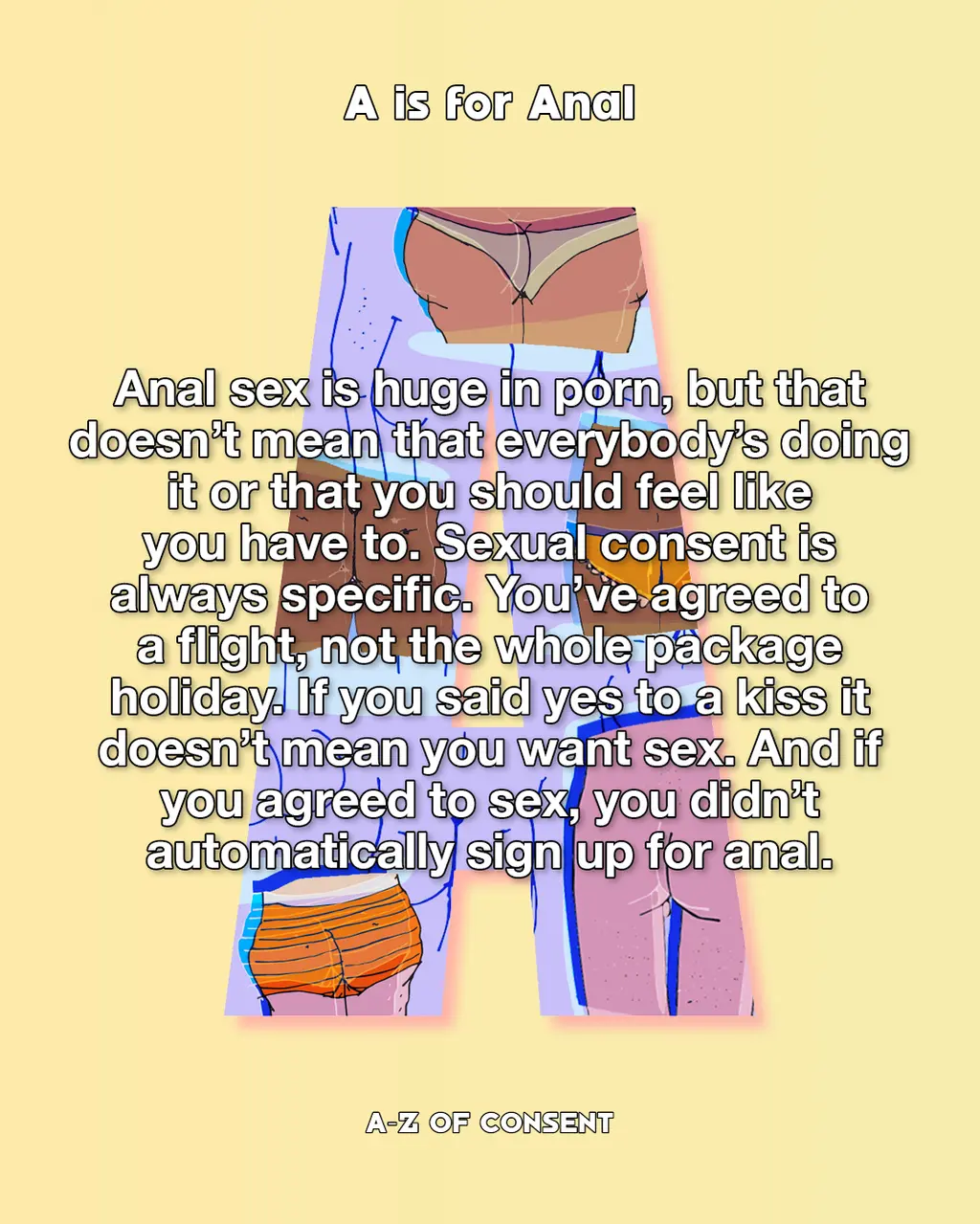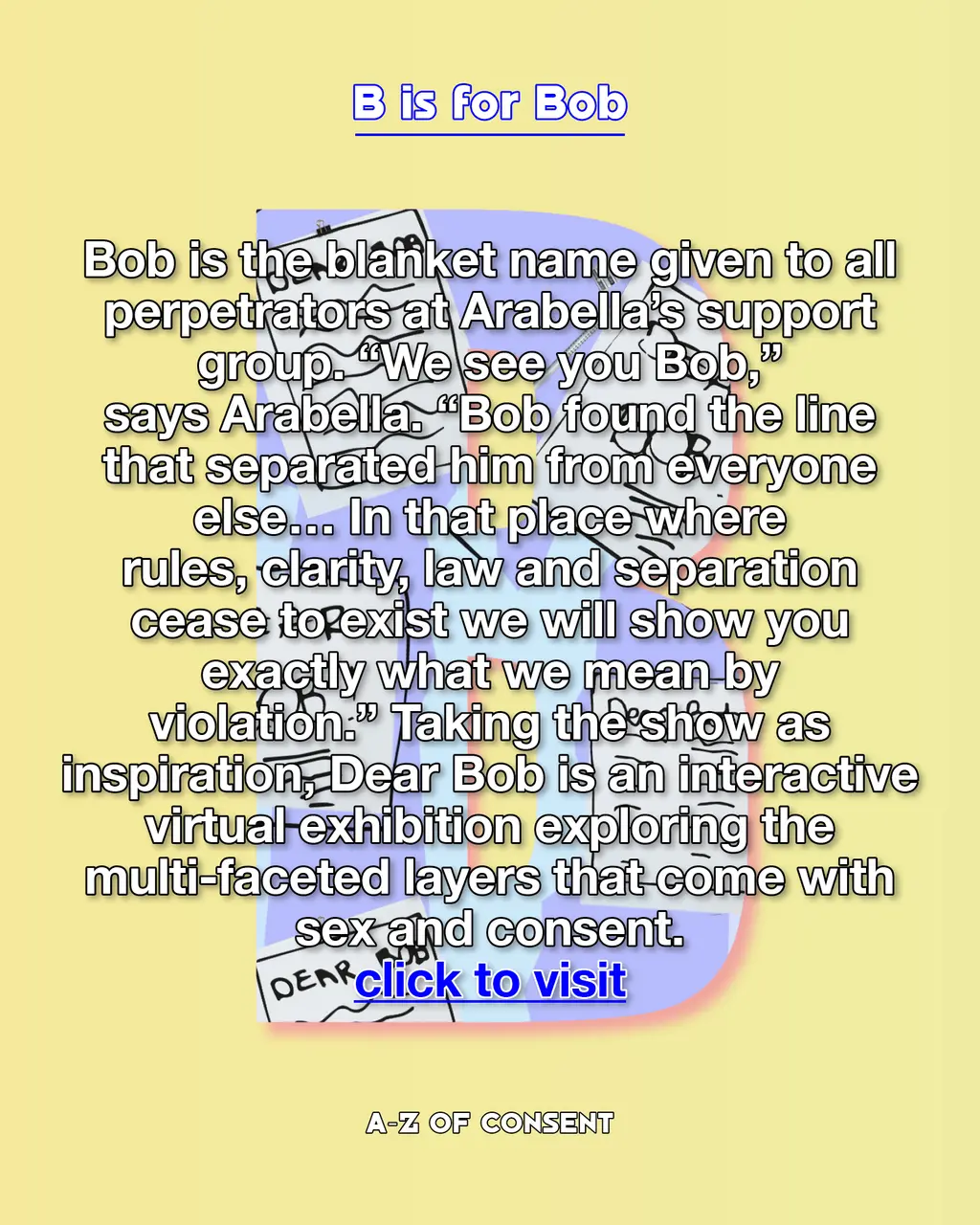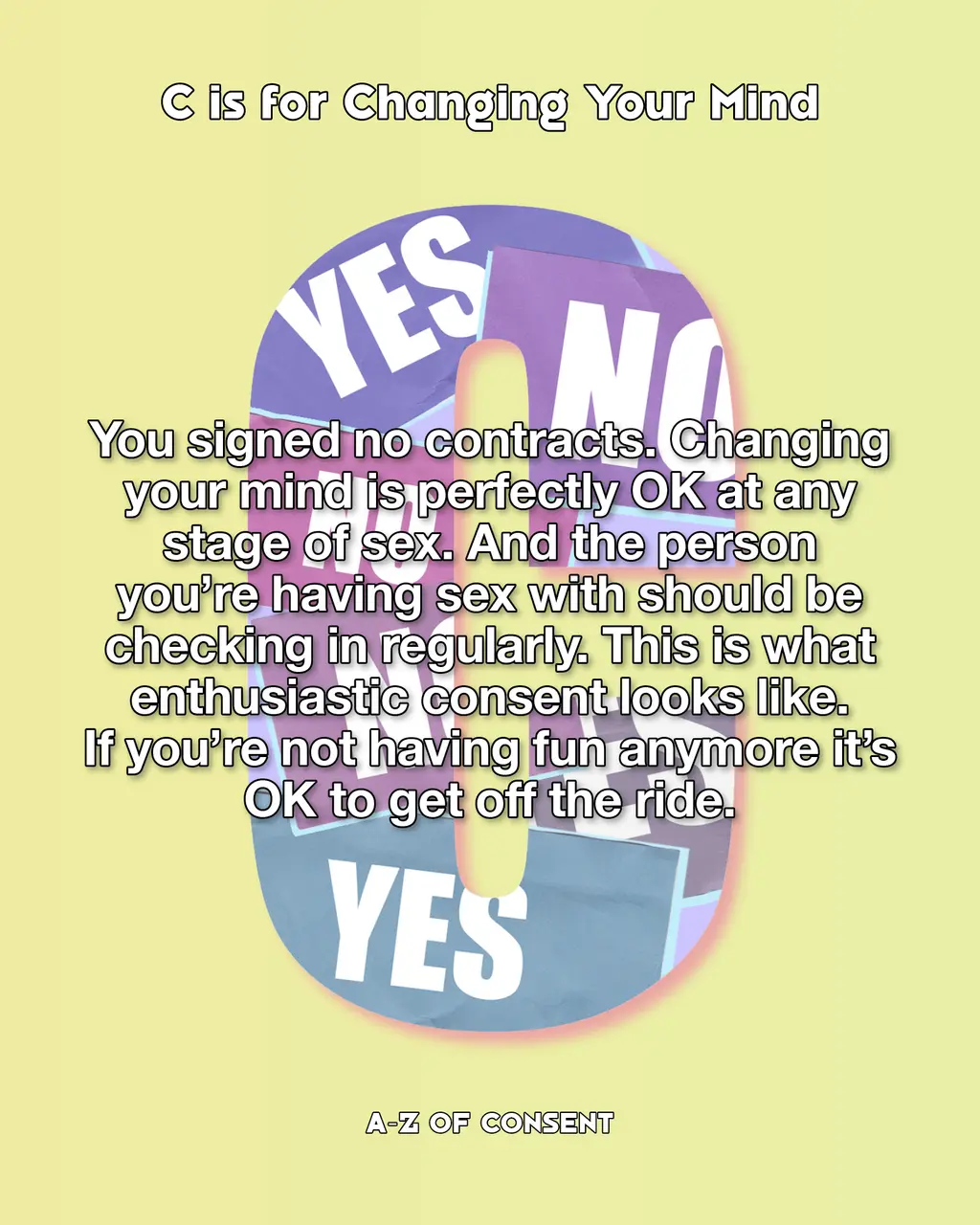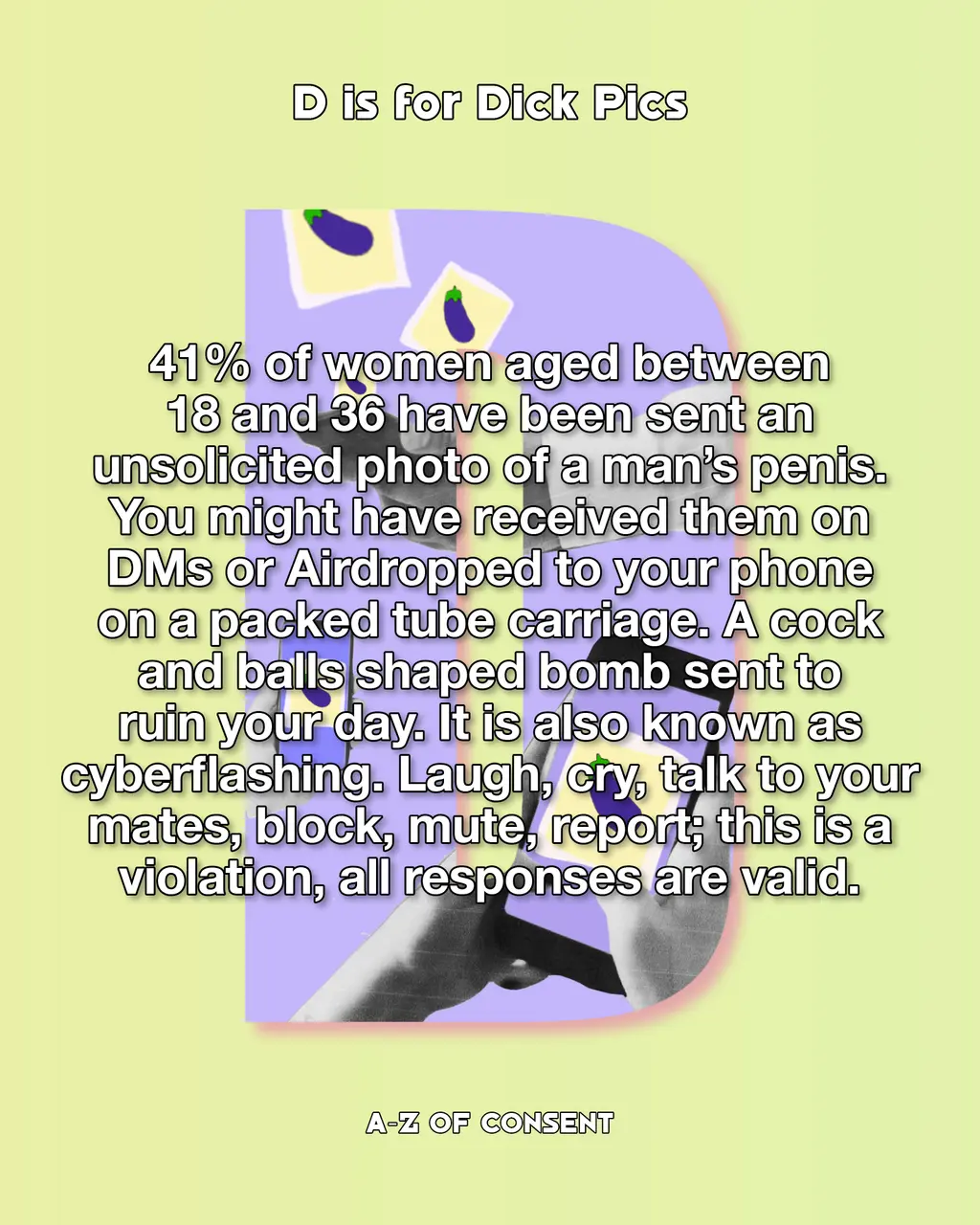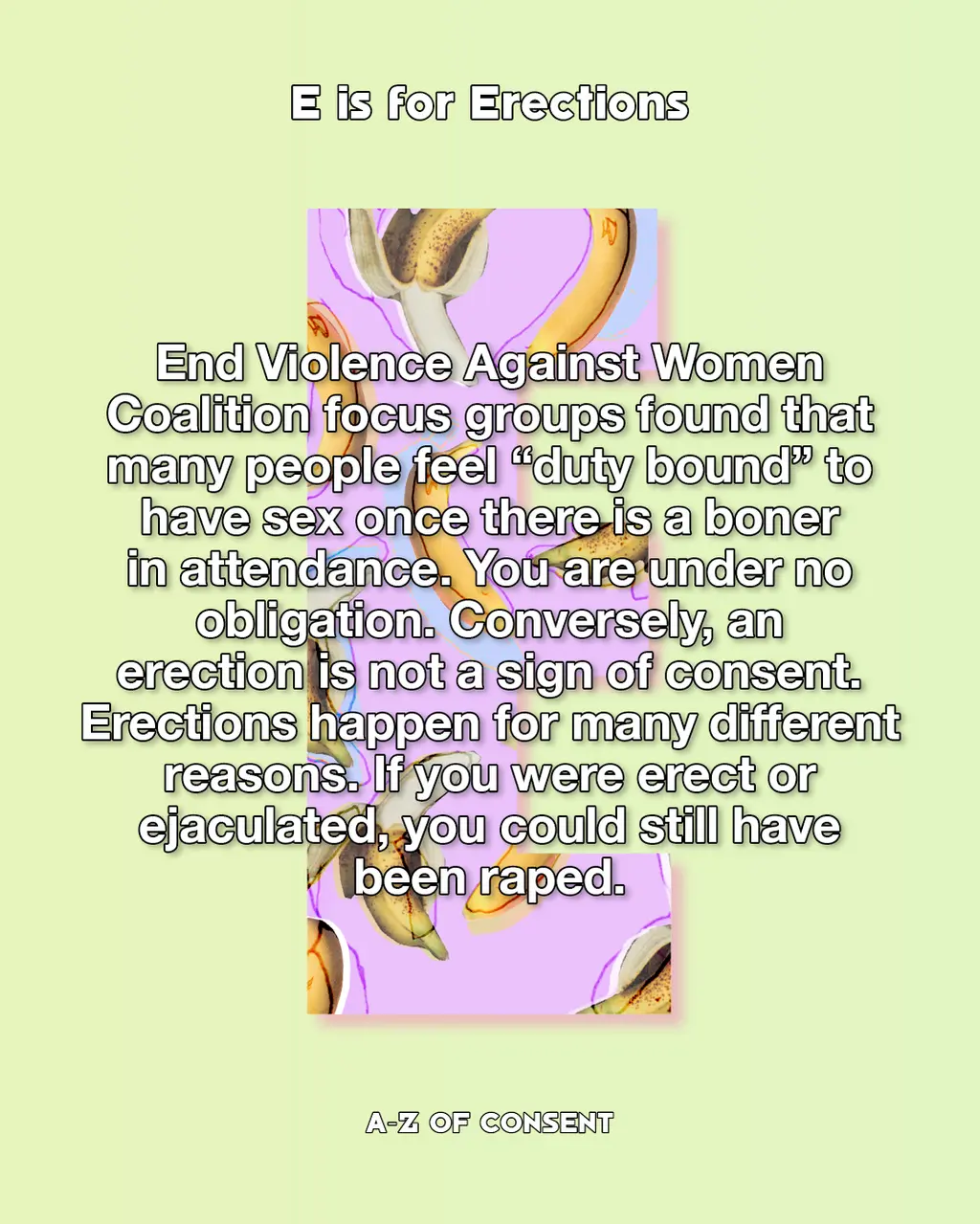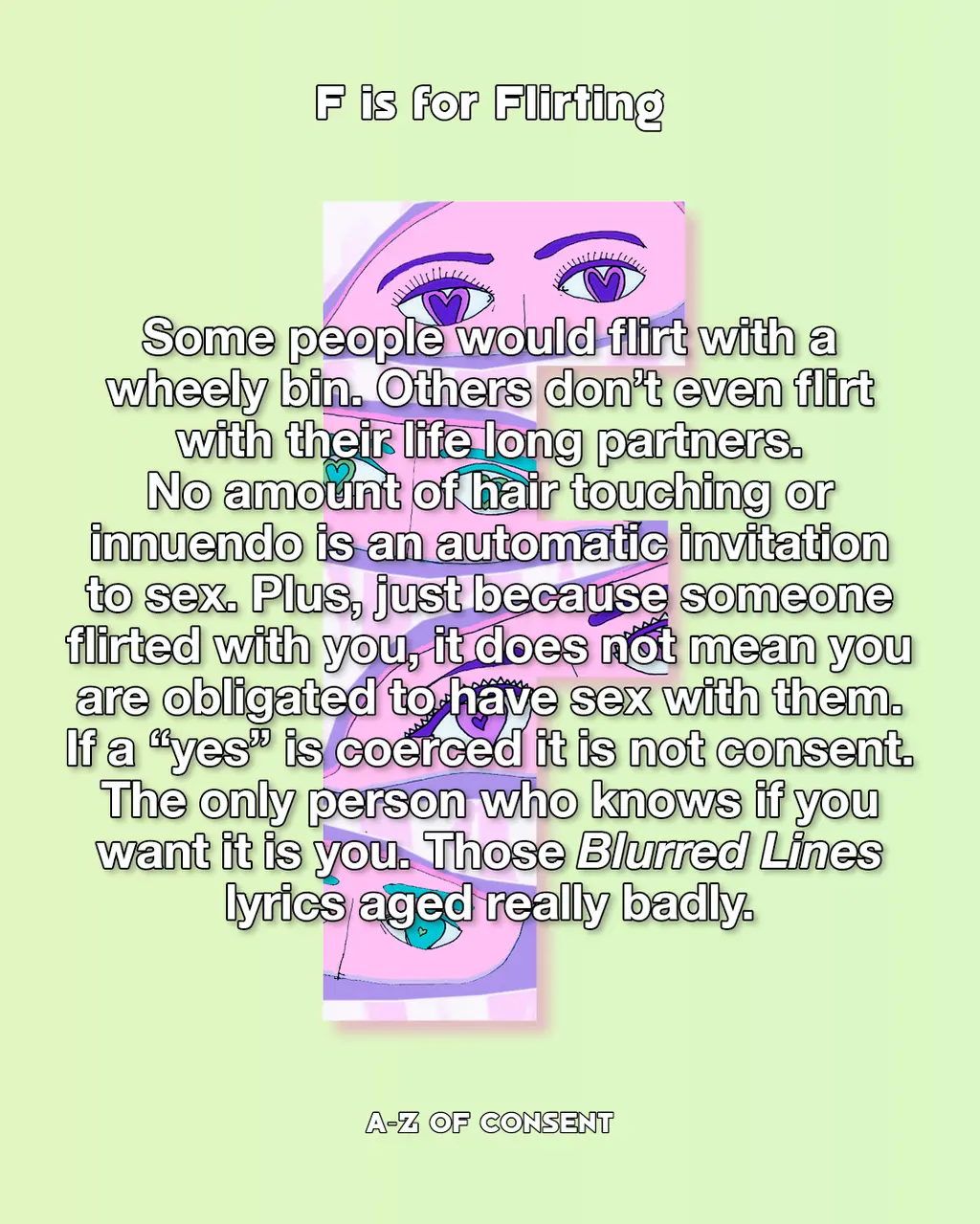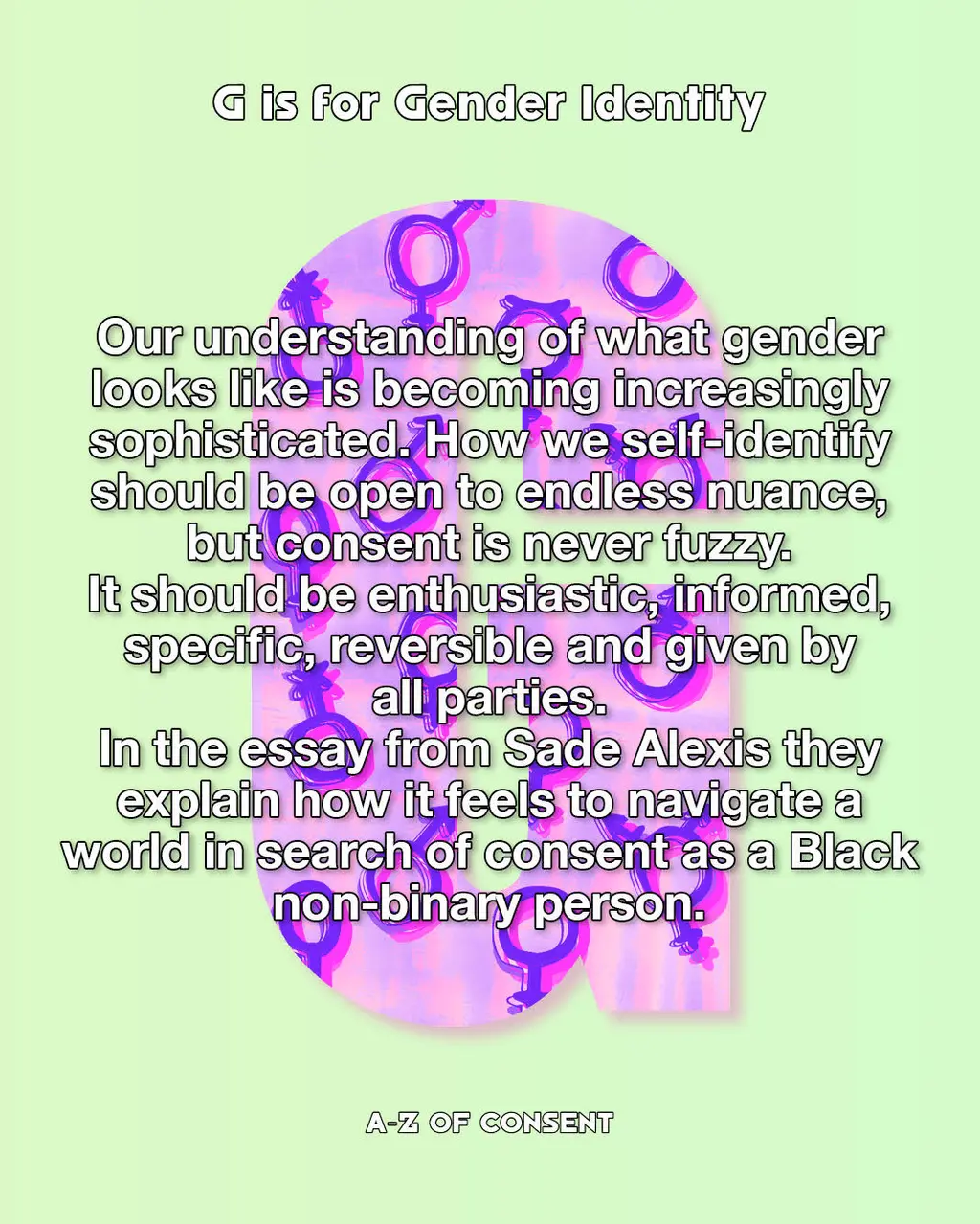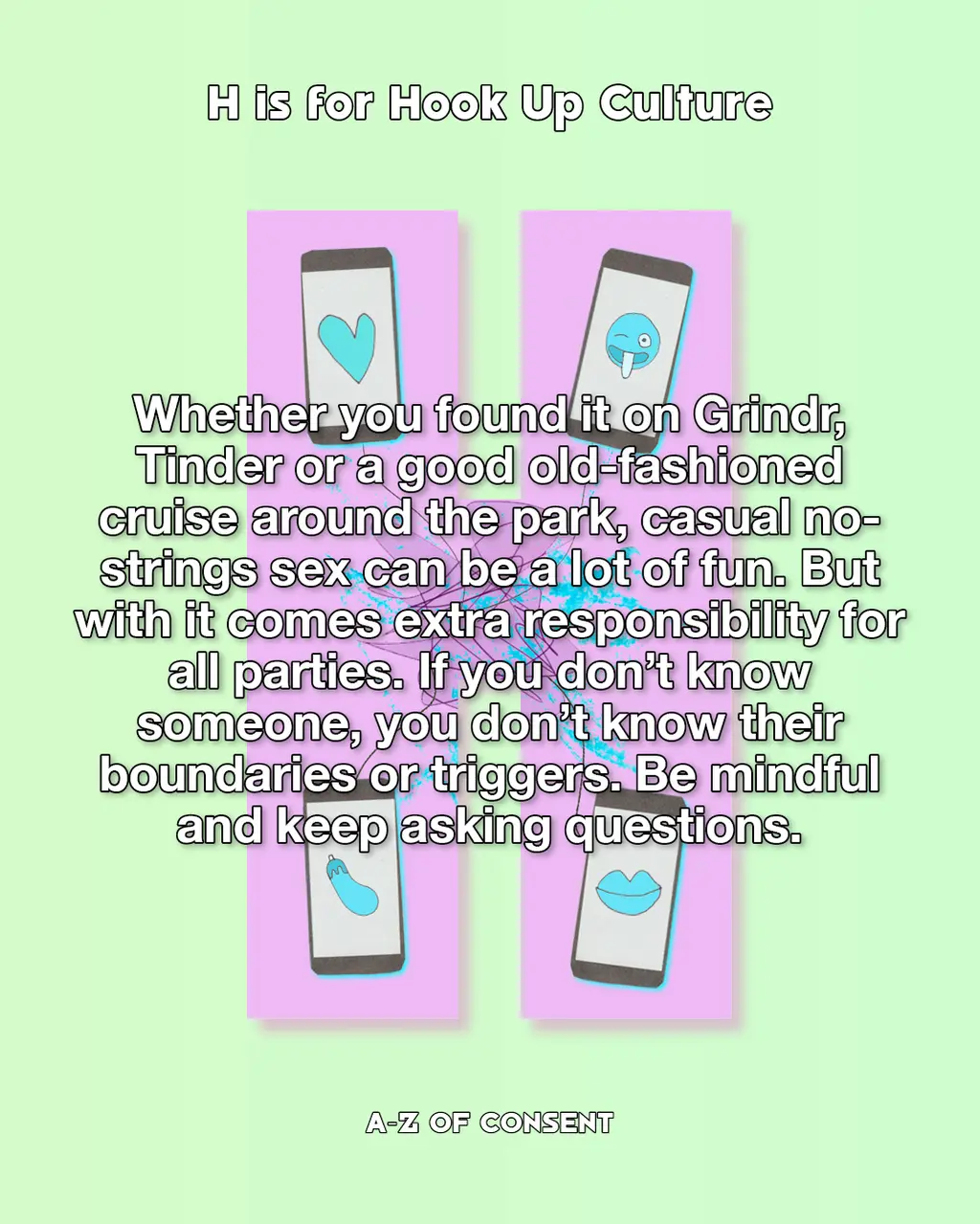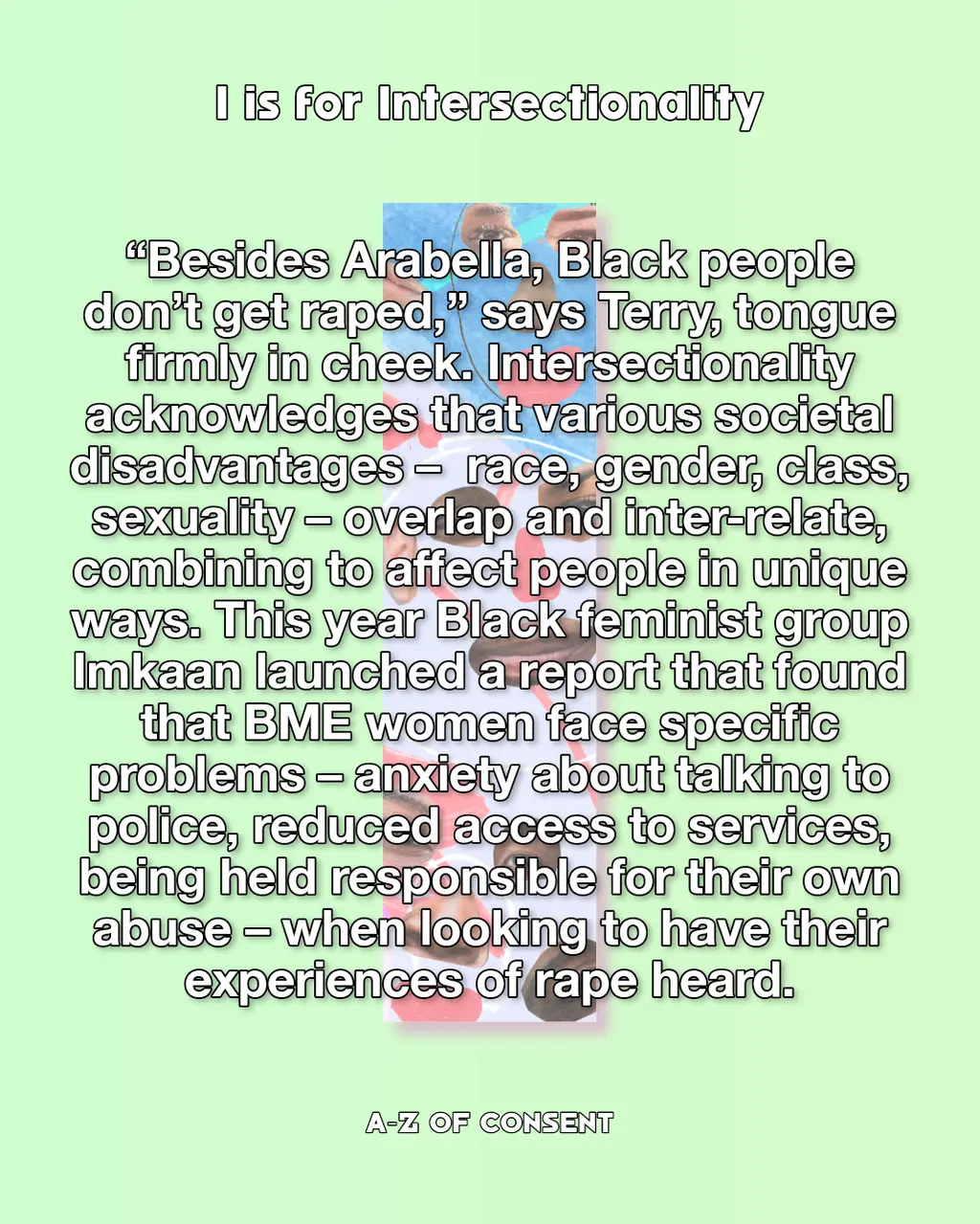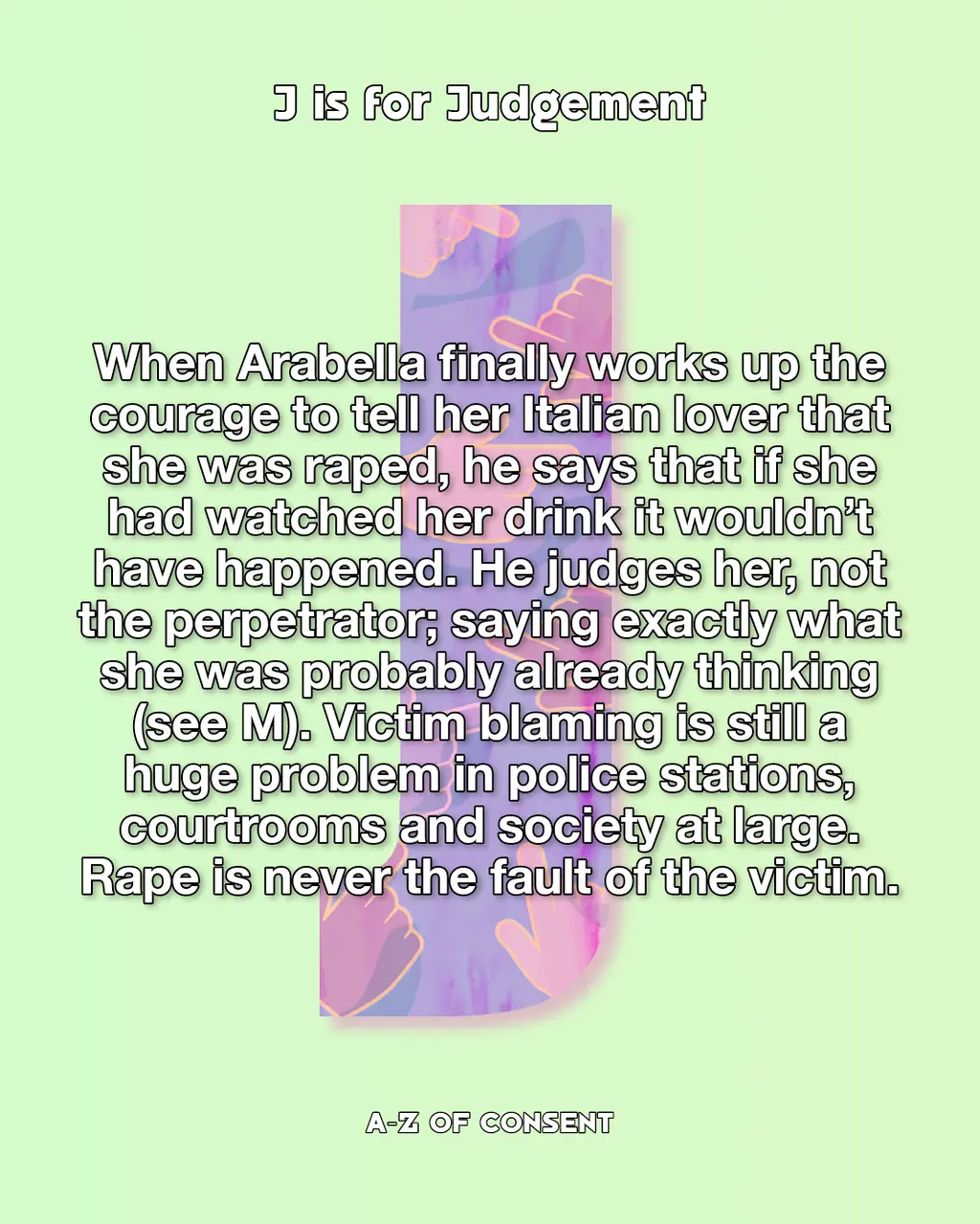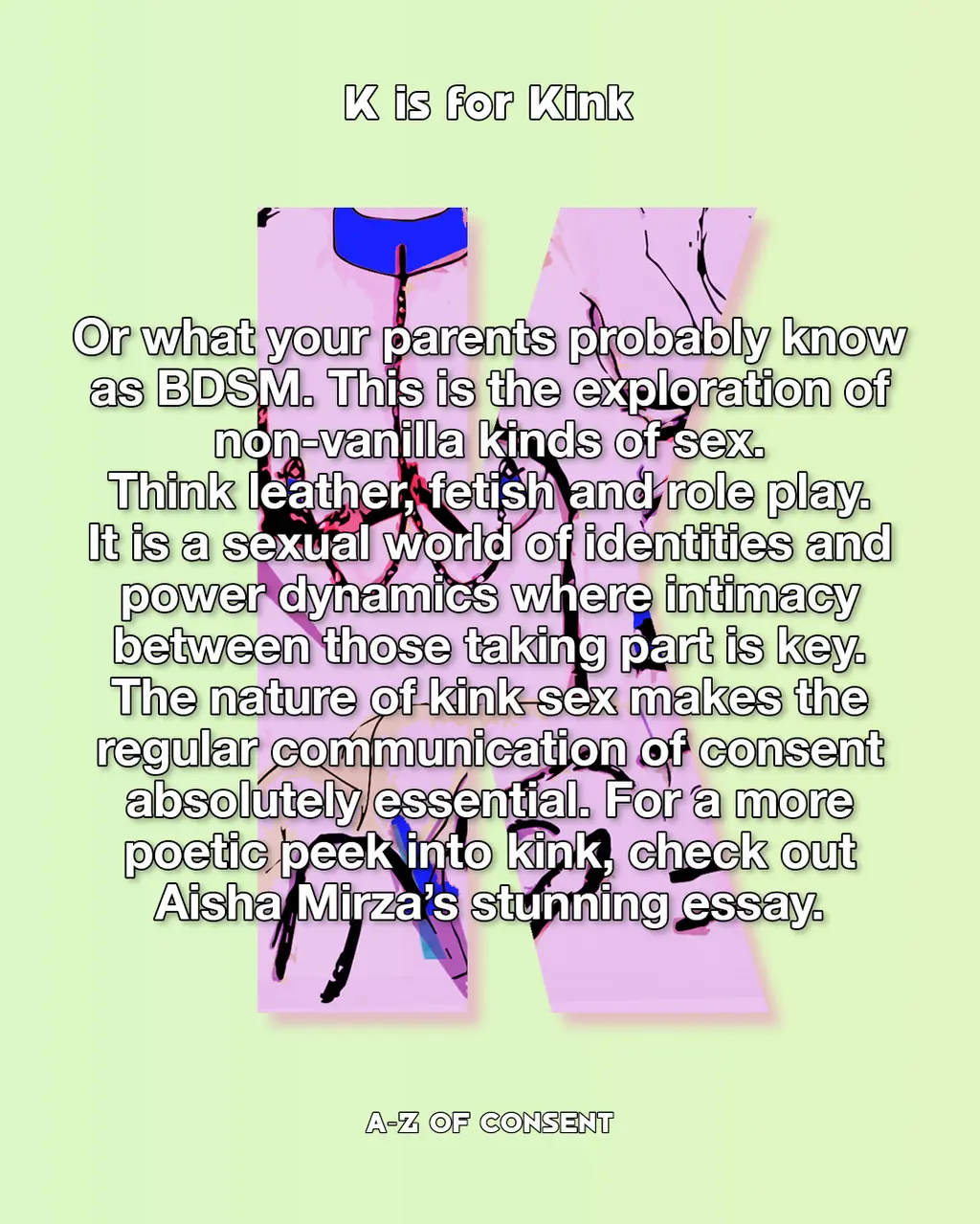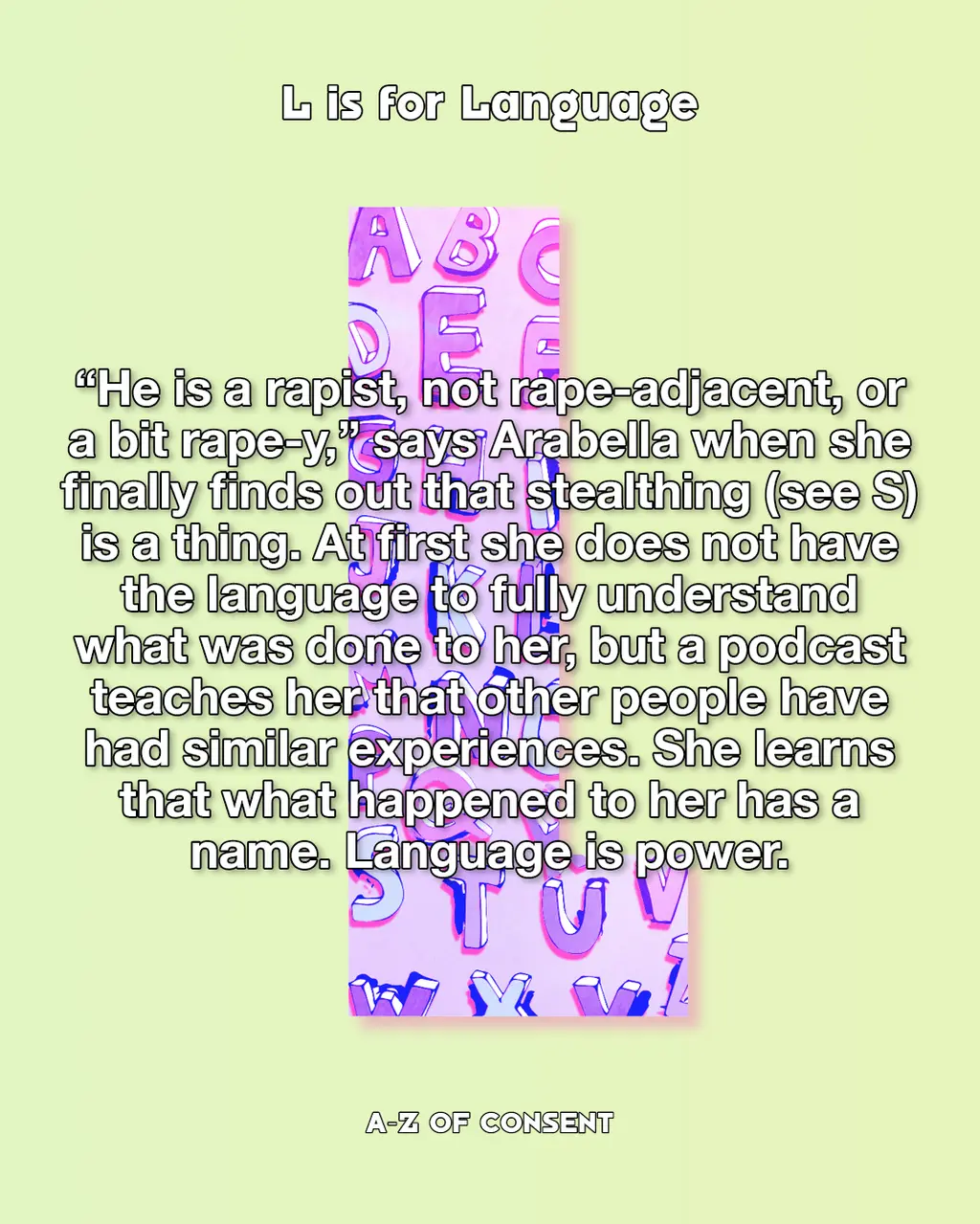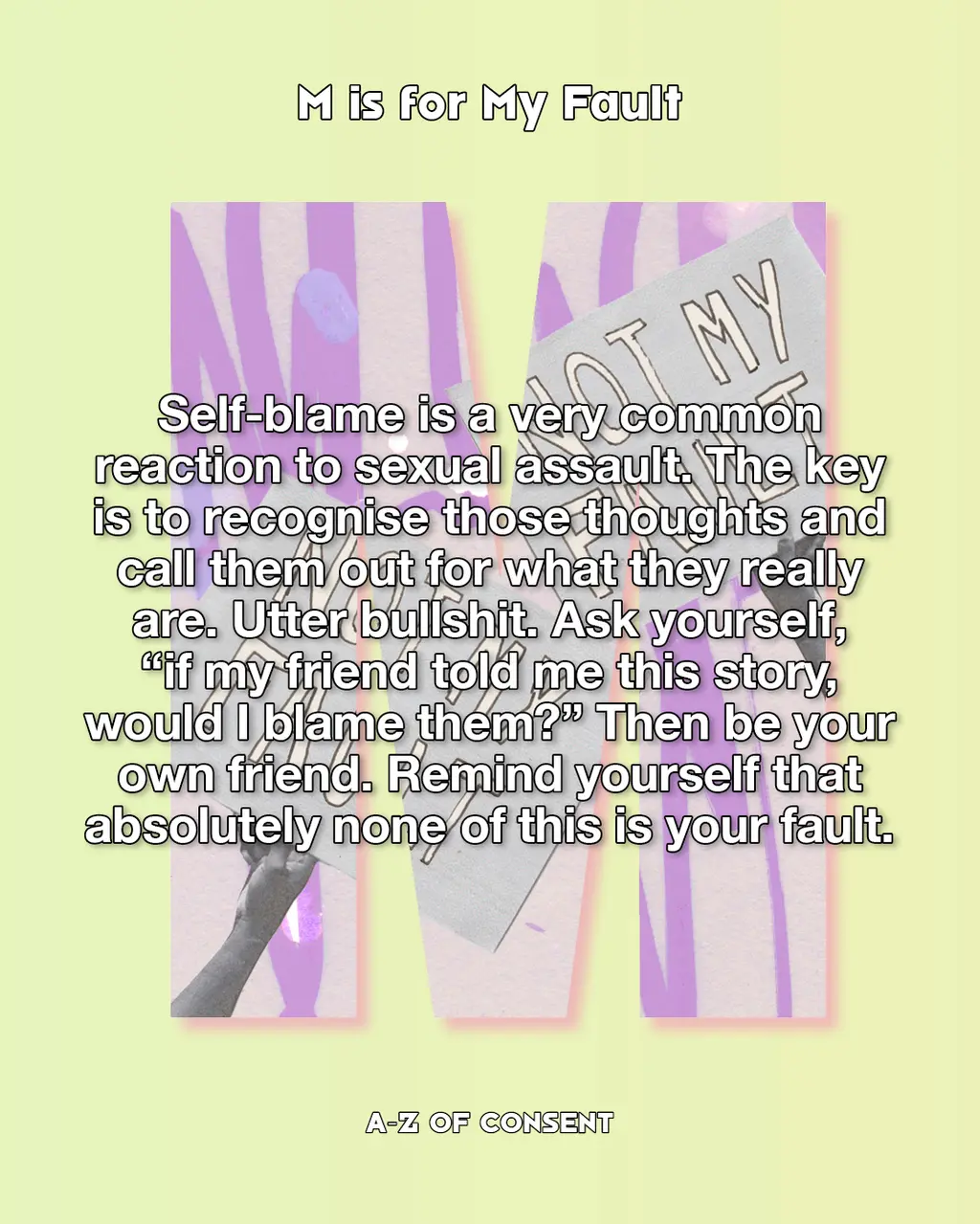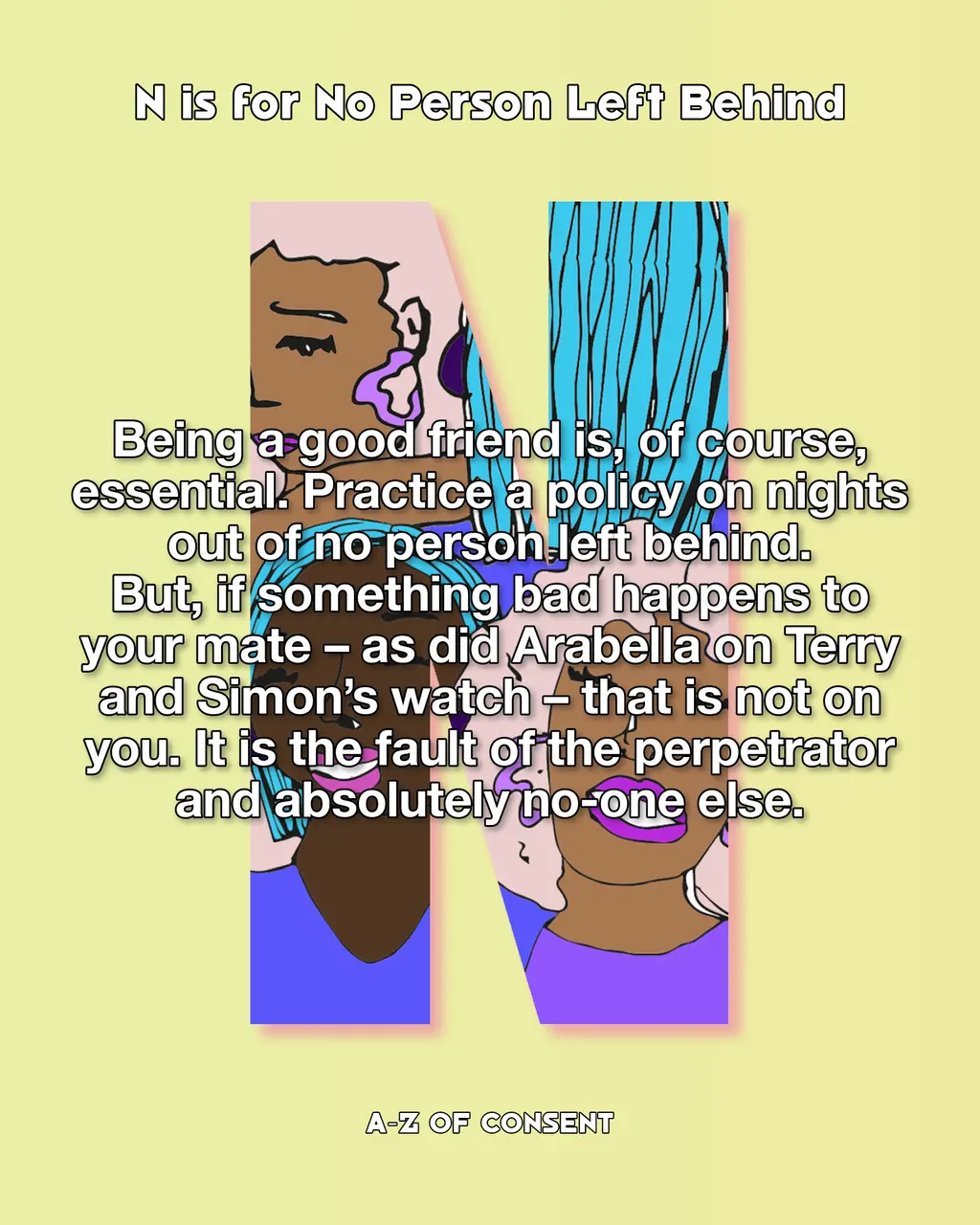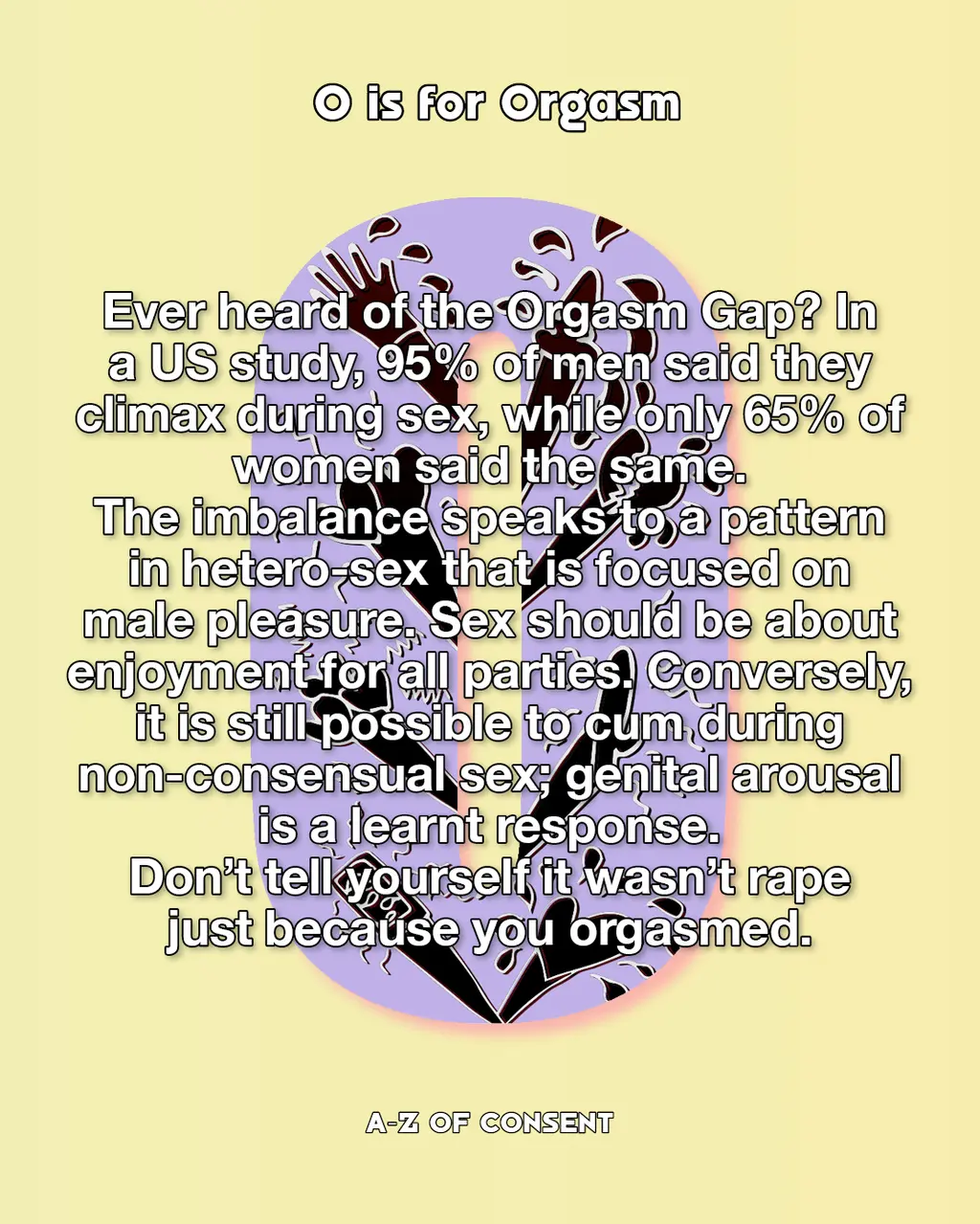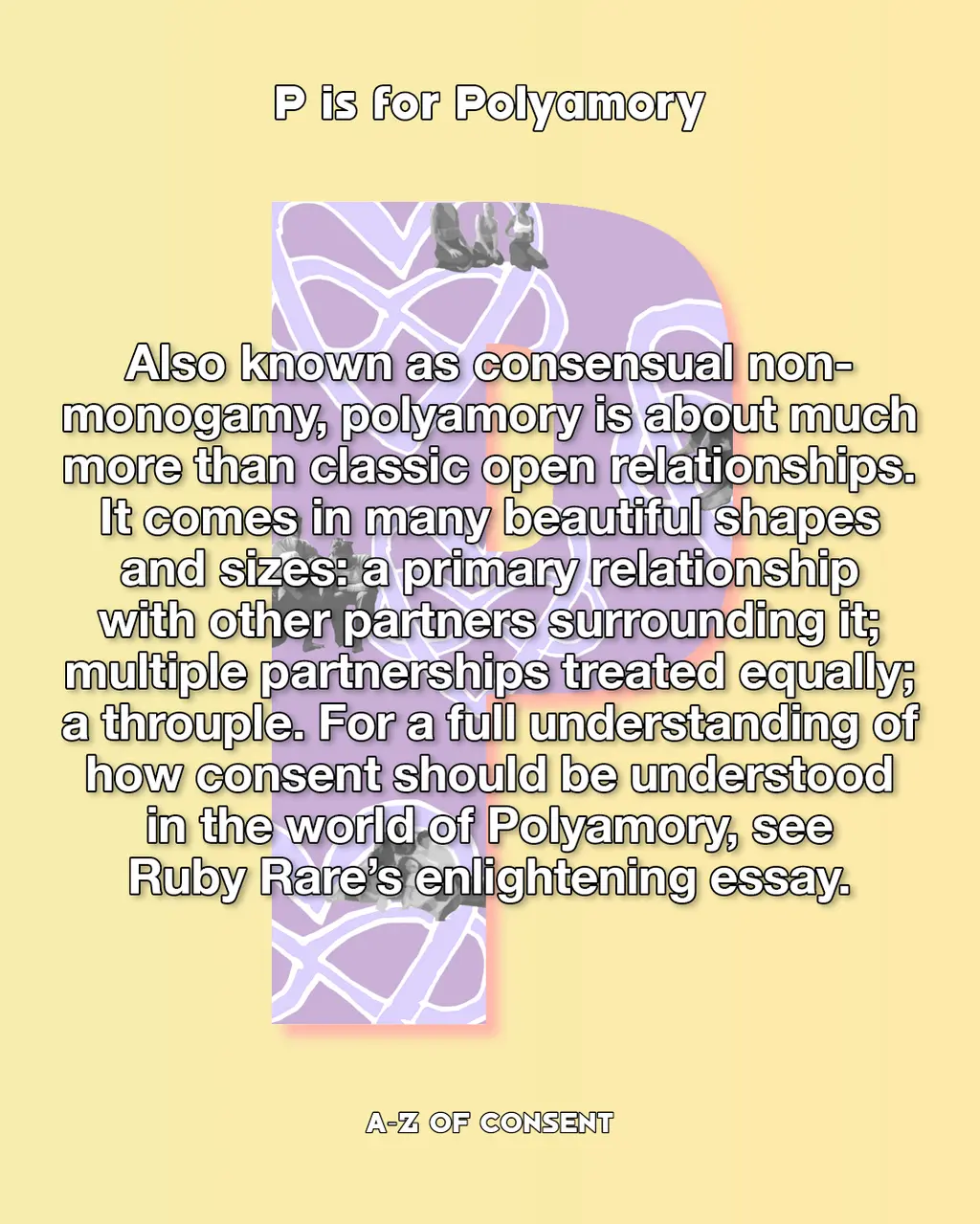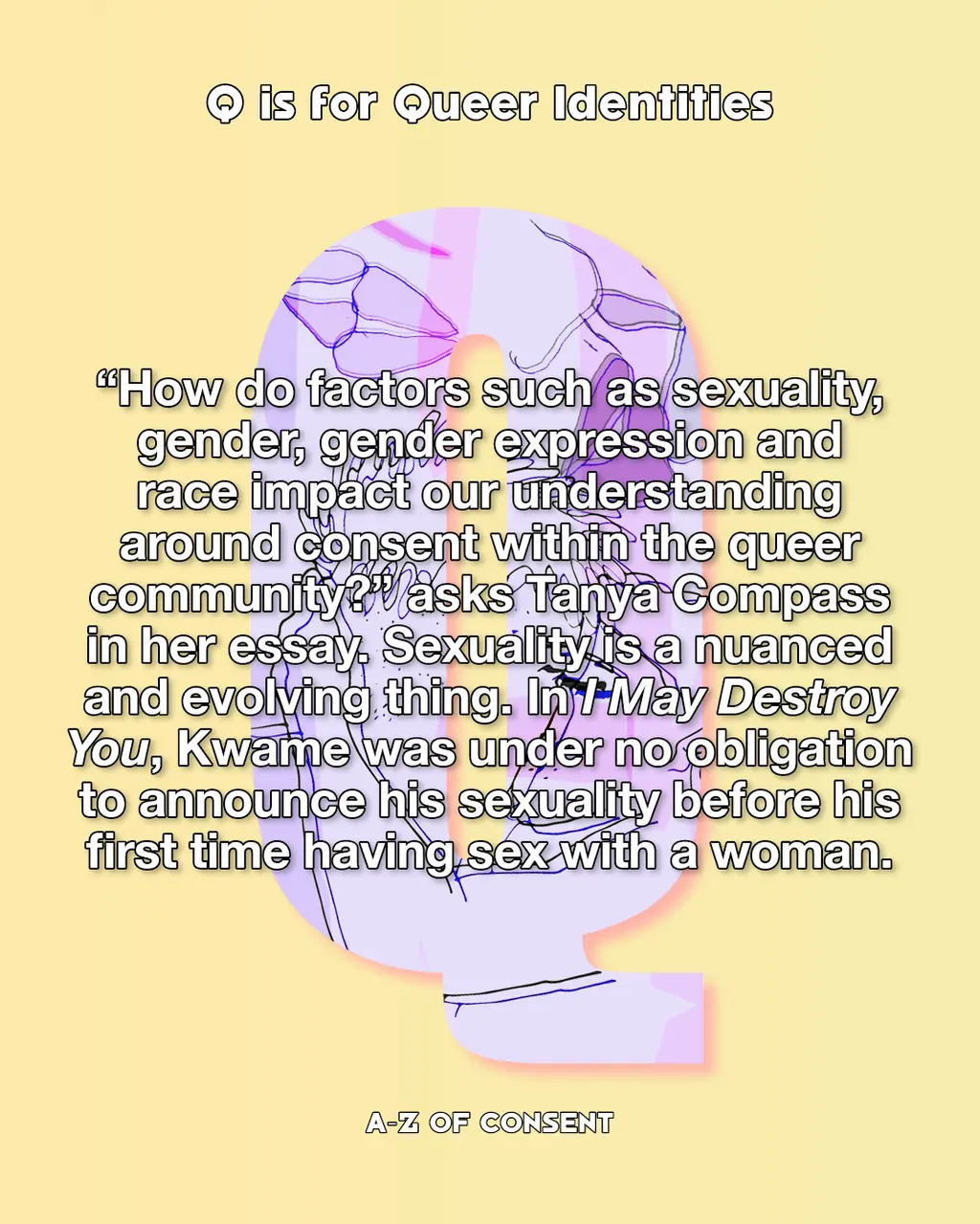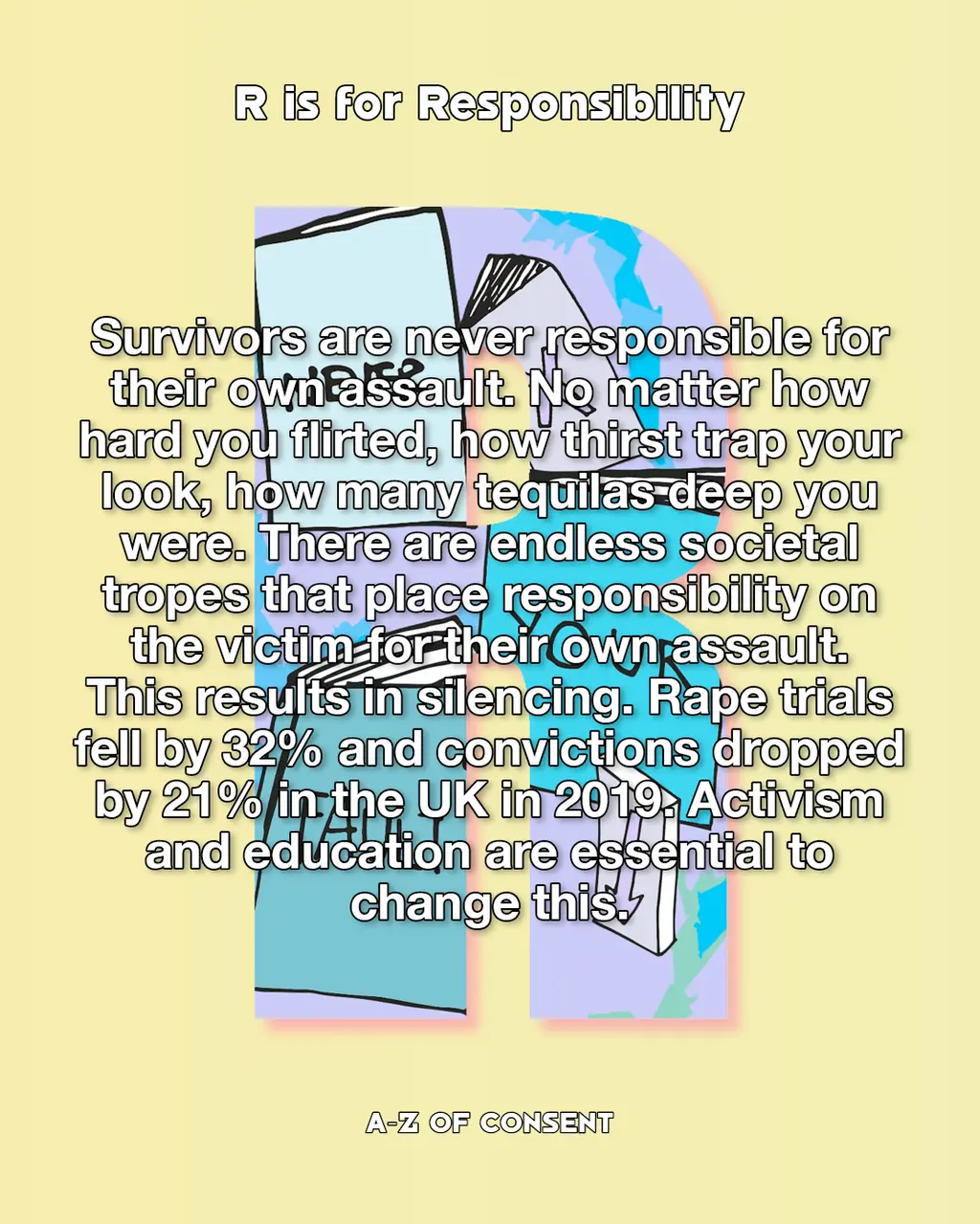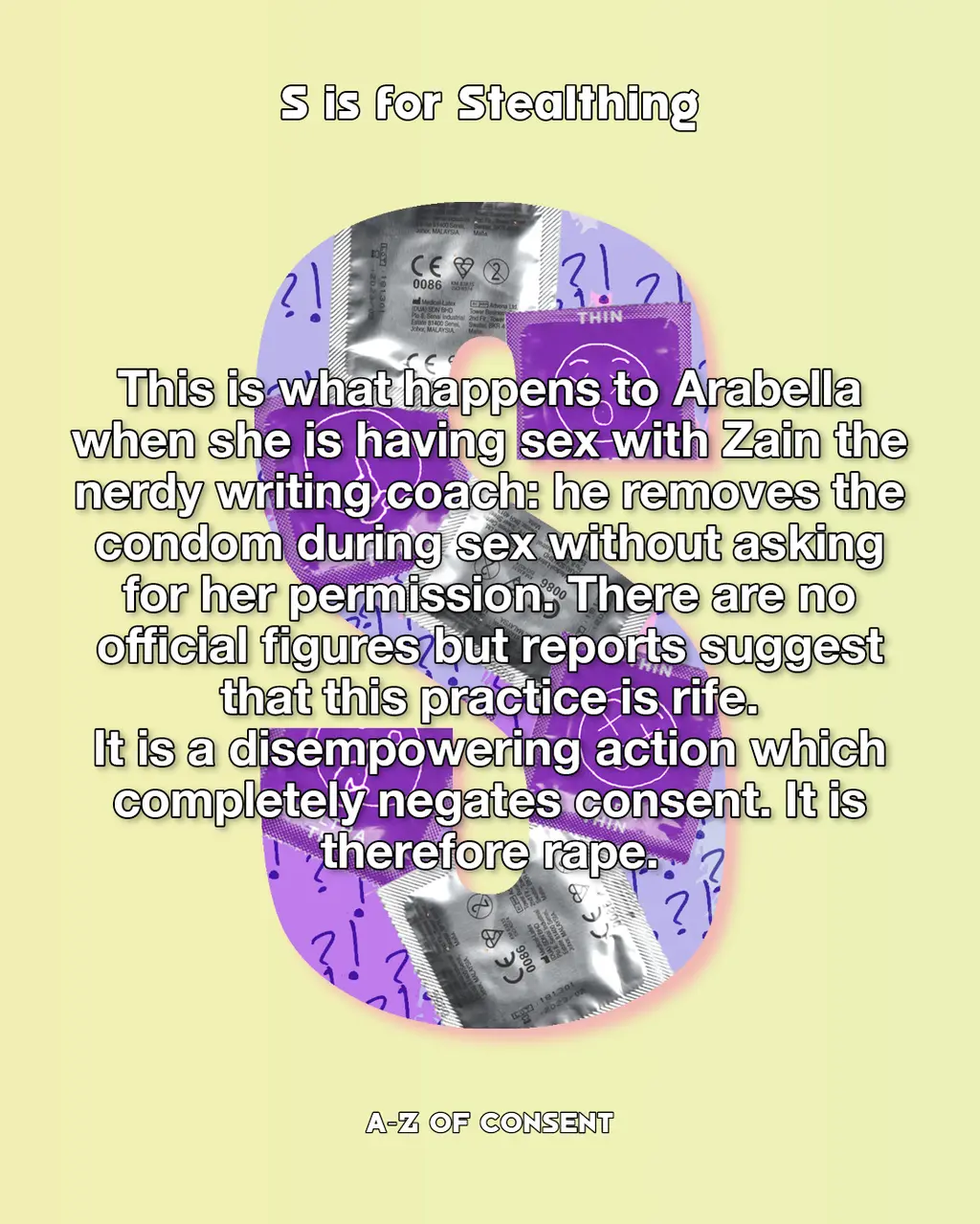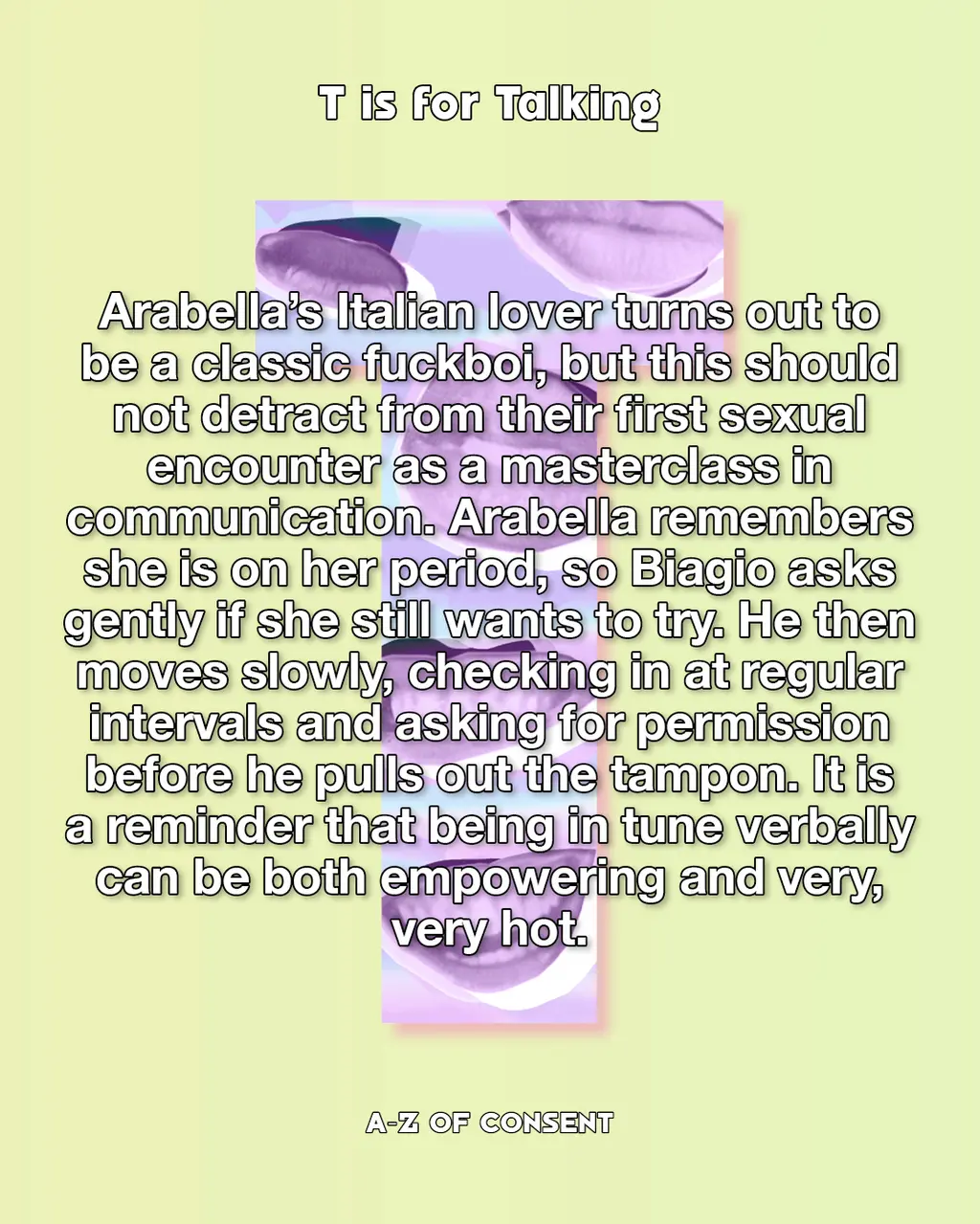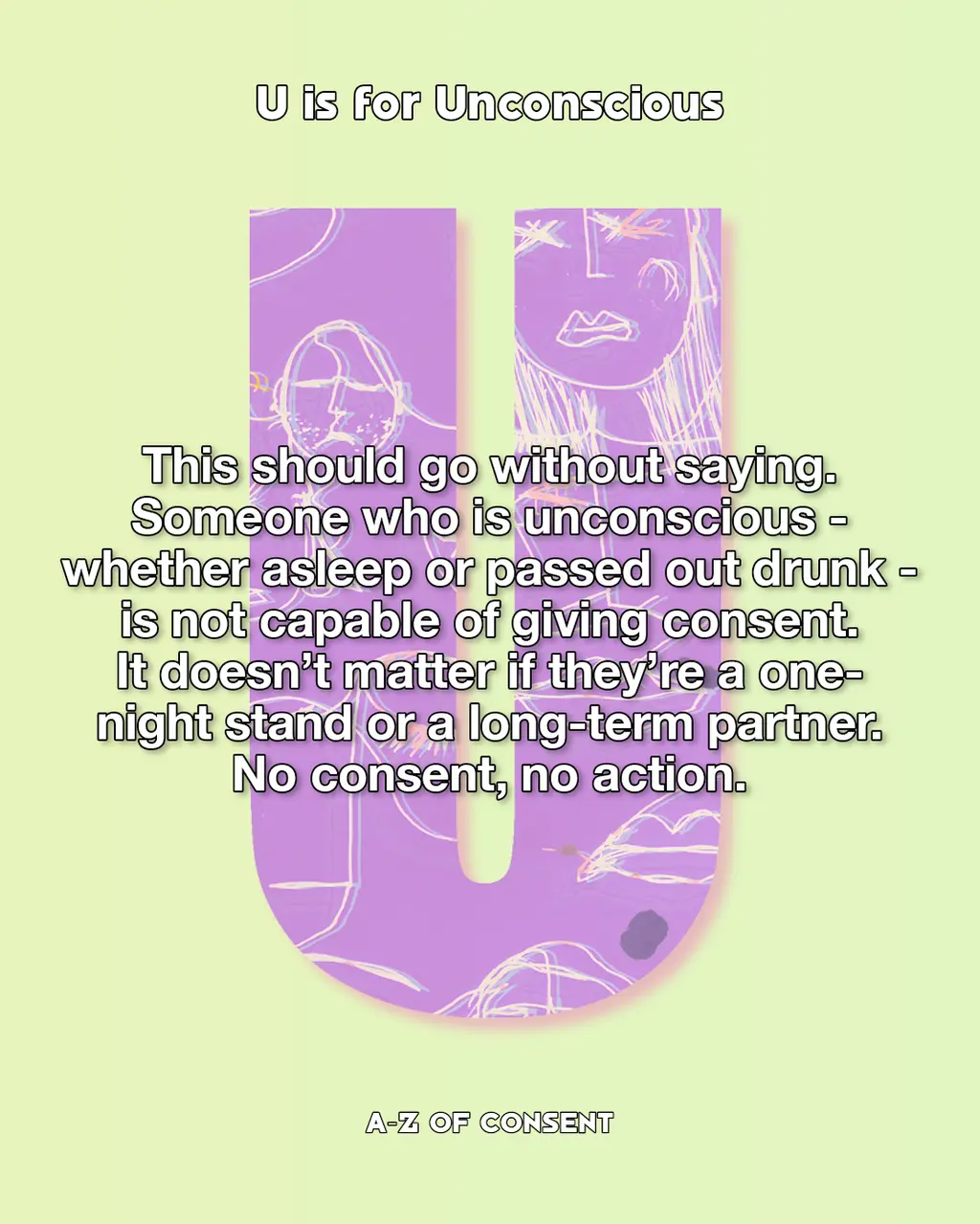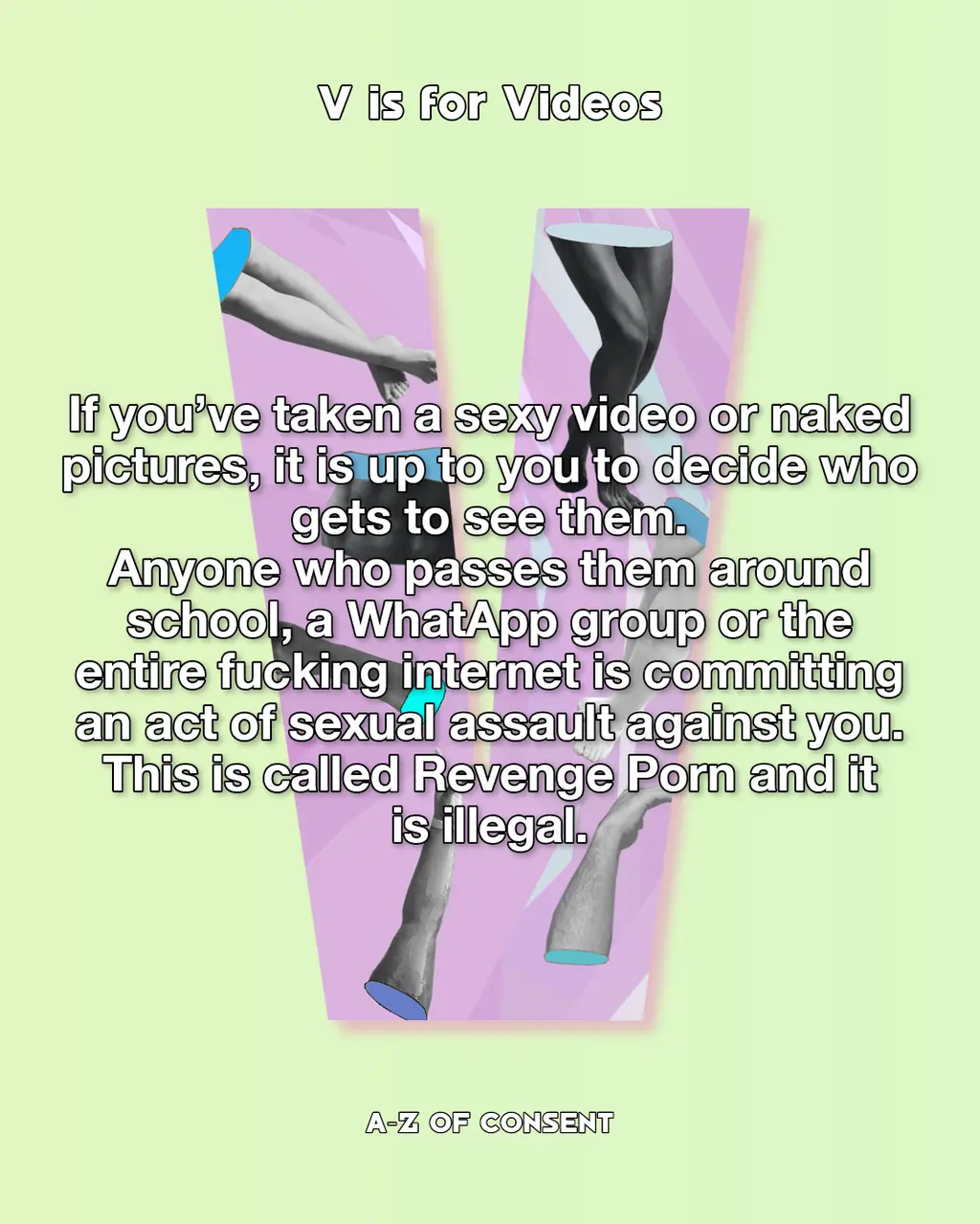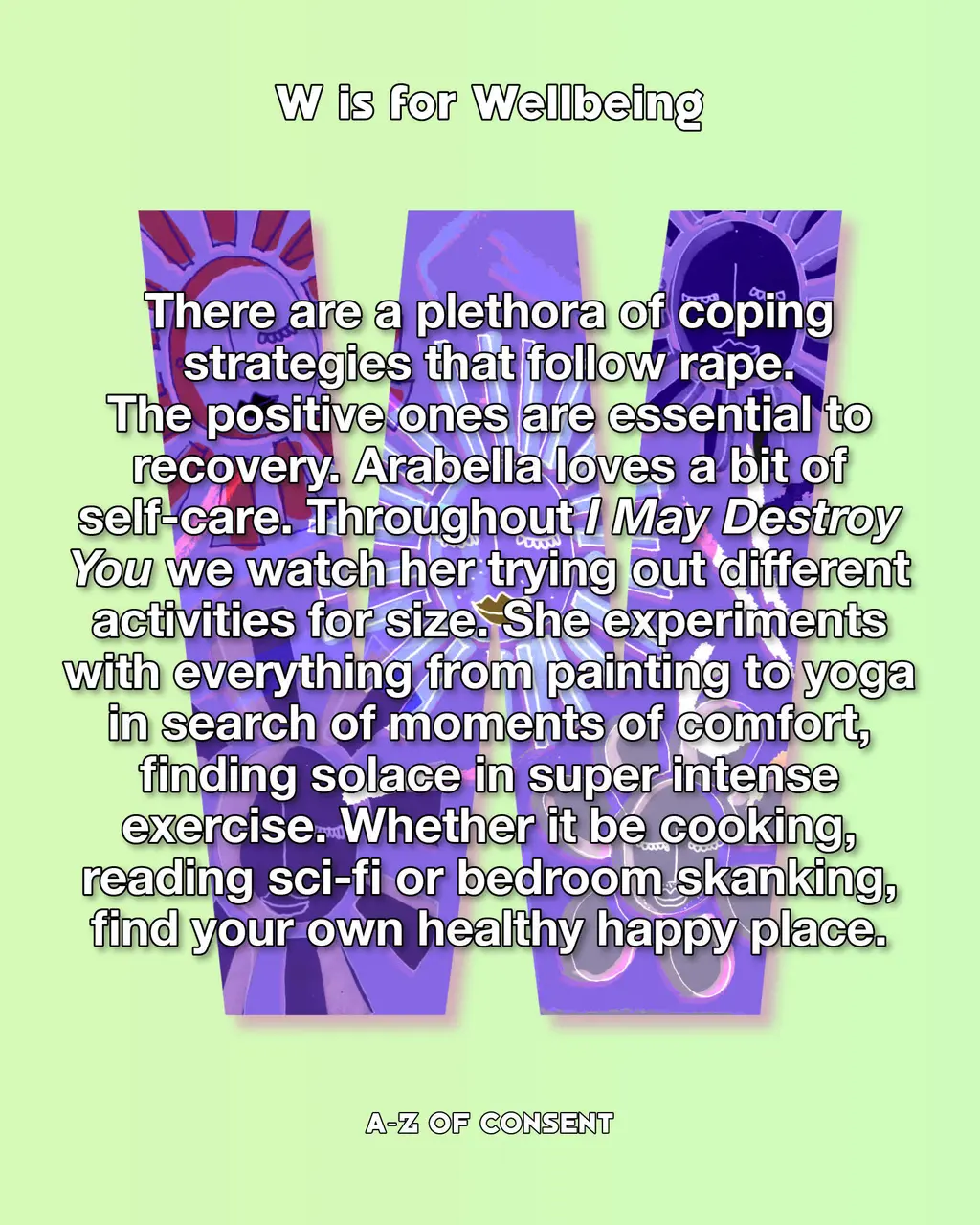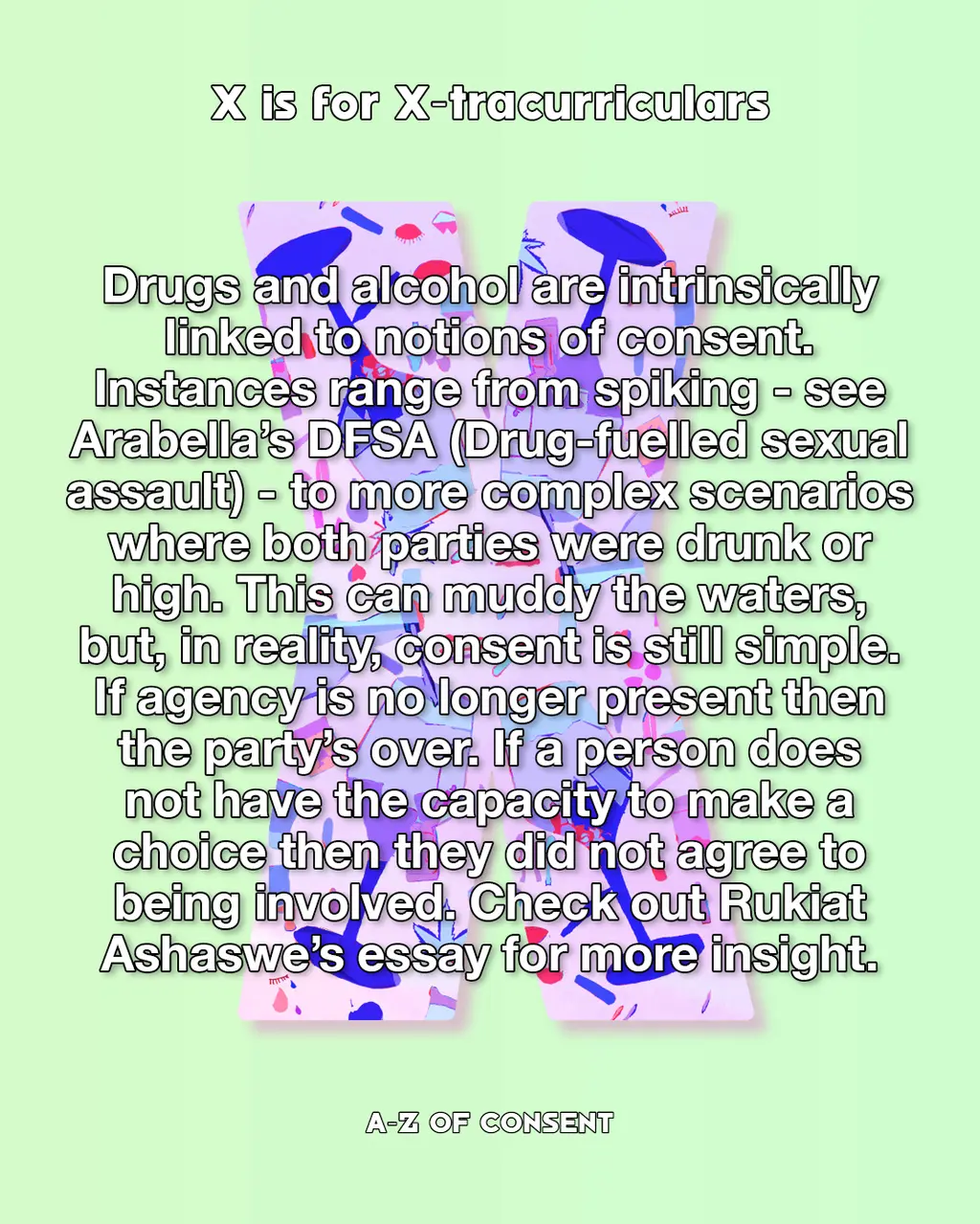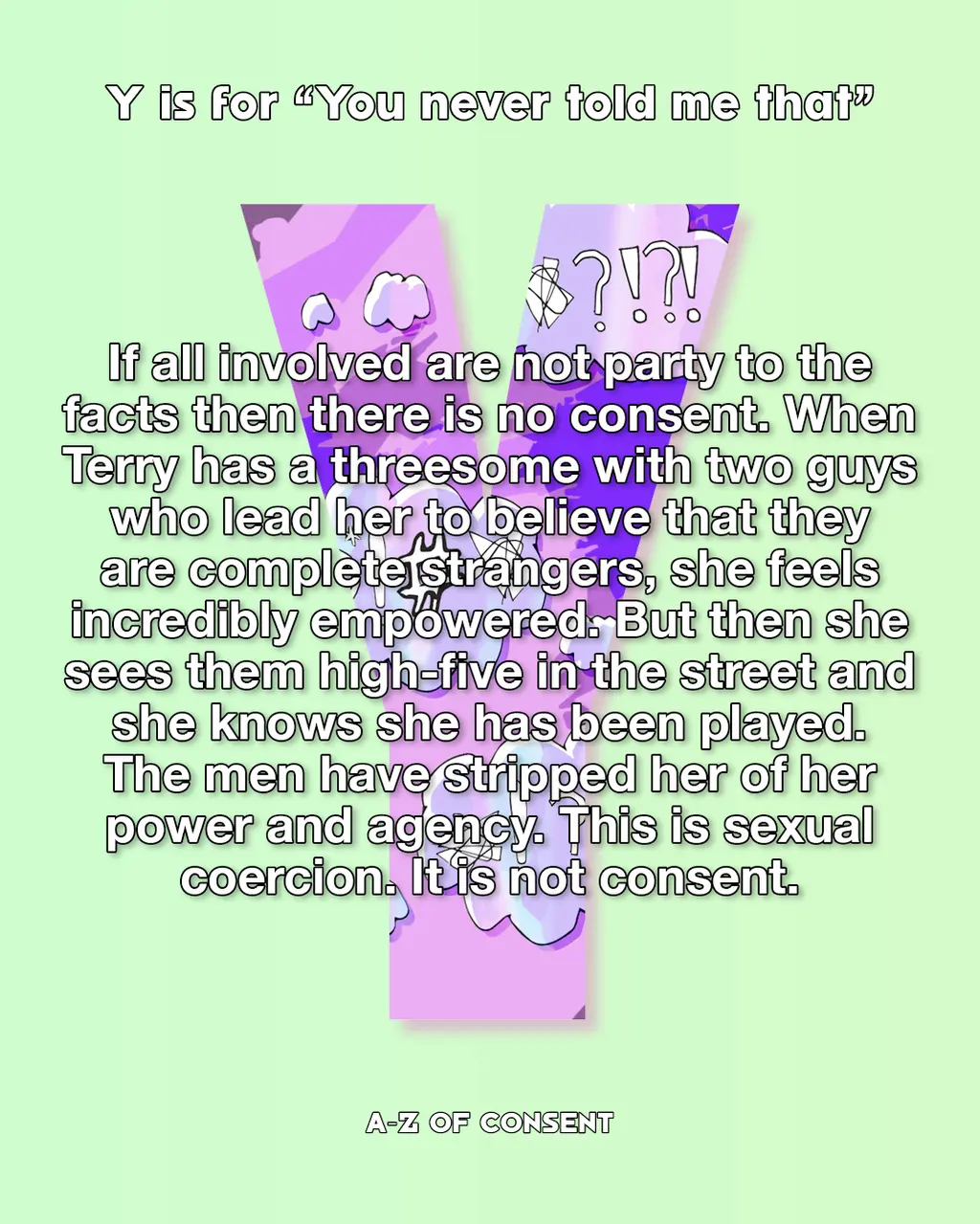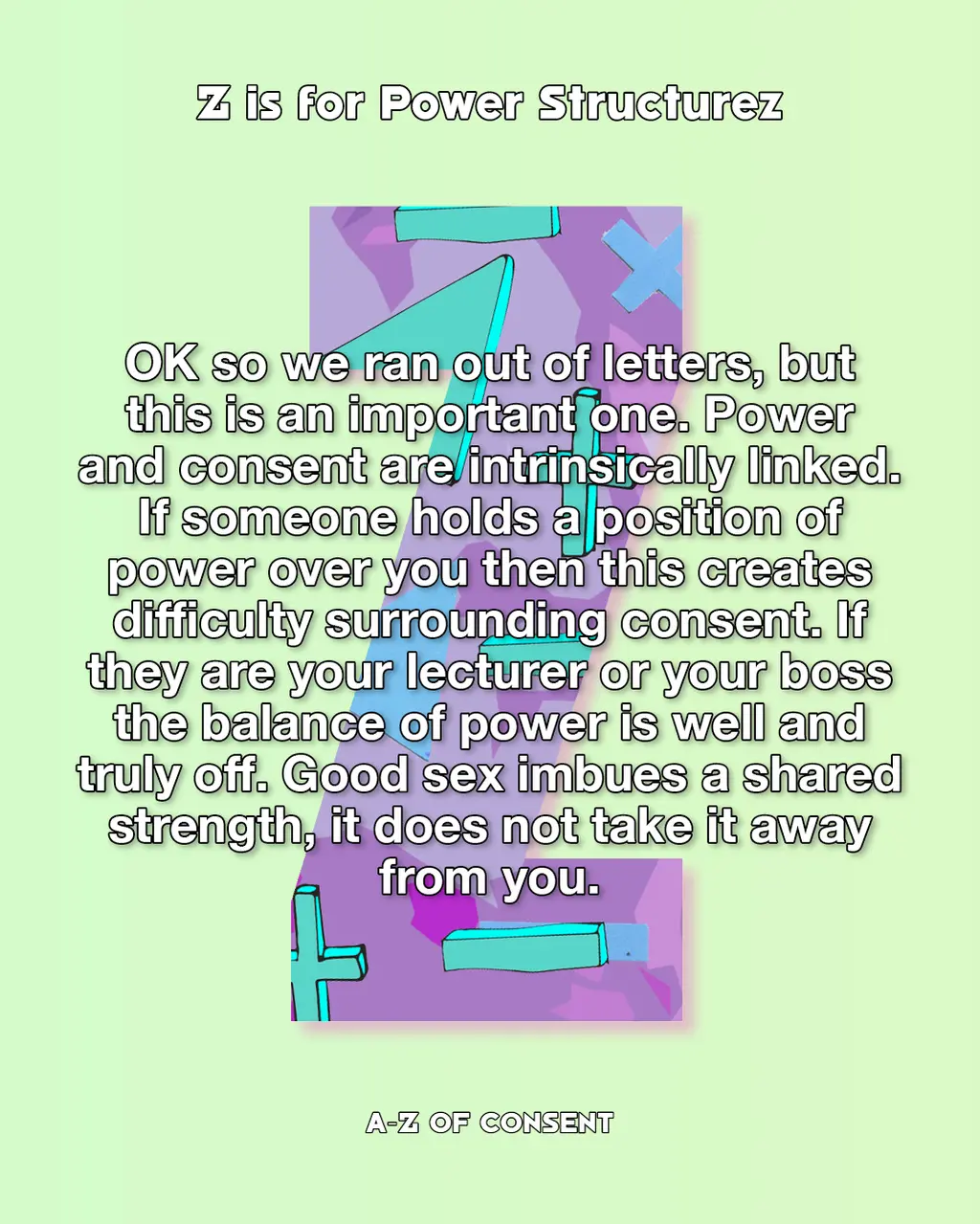The Ins And Outs Of Consent
In partnership with BBC


“In that place where rules, clarity, law and separation cease to exist we will show you exactly what we mean by violation”
A digital zine that explores the grey areas of consent from multiple perspectives. Brought to you by gal-dem, BBC and The Face in response to and in praise of the BBC’s I May Destroy You.
Trigger warning: within the contents of this zine there is mention of sexual violence, domestic abuse and physical violence
There’s a good chance that BBC’s I May Destroy You taught you more about the nuances of sexual consent than anything you learnt in school. Arabella, Kwame and Terry’s lived experiences look a lot more like the highs and lows of hook ups than what was served up in your sex ed class.
It’s time we took our understanding of consent to new places; widening the lens, letting go of heteronormative, cisgendered, monogamy-centric viewpoints and digging deep on what rape can really look like. You don’t need to have watched the show to read on, but it makes a great starting off point. See this as the beginning of an ongoing and evolving conversation. A long-lasting resource; read now, but come back from time to time.

The A-Z of consent
Chapter 1: Polyamory by Ruby Rare (she/her)

Trigger warning: mentions of sexual assault and trauma throughout
I was taught very little about consent at school. “No means no” was mentioned a few times, but consent was framed as something men had to ask for and women had to give – all super heteronormative, centering monogamy, and failing to recognise the nuances of navigating consent in “non-traditional” settings. As a queer polyamorous person, this gave me approximately zero per cent of the tools I needed to exercise consent in my life. Instead, my understanding of consent had to be learned on-the-job.
Cultural messages about consent are already fraught, but when applied to non-normative relationships it’s a real headfuck. Over time, I’ve become more confident with my personal understanding of consent and agency, but because none of the education I received spoke to my identity, it was a challenge.
The assumption that polyamory is a free-for-all wild orgy is (for the most part) false. In my experience, the more people involved, the more structured the conversations and agreements need to be. When I started exploring non-monogamous dynamics, I had no idea just how much time I’d be spending on emotional admin! Navigating the needs of multiple partners, and ensuring everyone’s boundaries are respected is a challenge. When it works, there’s a wonderful feeling of community. When it doesn’t, the domino effect is rough.

Withholding information is one of the less recognised ways consent can be violated, which is explored through Arabella’s best friend Terry’s storyline in BBC’s I May Destroy You. Her realisation that a threesome was orchestrated by two men, rather than being spontaneous, resonated with me. I’ve been in similar situations where information was withheld in group sex situations. Like Terry, I felt pain, shame, and embarrassment when reevaluating these moments. Seeing my experiences reflected was difficult to watch, but ultimately validating.
Surviving sexual assault can be further complicated when it occurs in a polyamorous context. I’ve experienced judgement because the assault occurred in a non-monogamous “promiscuous” setting. This judgement on top of the assault itself is an added layer of pain survivors should not be subject to. But as shitty as this is, there are positives too. My polyam network has rallied around me when I’ve struggled with my own survivor-hood – it really helps if you can surround yourself with people who understand your relationship style and make you feel supported.

When you really boil it down, consent is about communication, so learning how to communicate effectively is essential. But sadly, this is another thing we’re rarely taught about. We still exist in a culture that doesn’t value transparency. Messages about being aloof or mysterious still dominate our attitudes towards dating and sex. We’re taught to rely on assumptions instead of giving and receiving the relevant information needed to make consensual decisions. In my experience, communication works best when it’s explicit, creating as little room for misinterpretation and uncertainty as possible.

Polyamory has helped me improve the ways I communicate; to assess what I want as an individual, as well as how I navigate consent with others. We all have a duty of care to the people in our lives, and the commitment to centre consent in all my relationships is something I’m proud of.
Ruby Rare is a sex educator. She is an ambassador for Brook, the UK’s leading sexual health charity for young people, runs pleasure-focused workshops for adults, and is the co-founder of Body Love Sketch Club, a body positive life drawing class. Her debut book Sex Ed will be out later this year.
Chapter 2: Intoxication by Rukiat Ashawe (she/her)

Trigger warning: mentions of date rape throughout
The best planned nights out can end in a blurry, hopeless mess when drugs and alcohol are involved. Your brain the morning after is left with remnants of distorted, chopped up memories.
My favourite nights used to be the ones where I was tipsy, my actions were spontaneous and I had let go of all my inhibitions. But adventurous nights can have a dark side. This is something that the BBC’s I May Destroy You captured so accurately, forcing me to relive and re-assess my own experiences.
After I was date raped, the perpetrator told me that I had been “all over him”. His friend confirmed it, but I had no recollection of what had transpired the night before. With my memories disorganised I felt completely bewildered by what I was told. It was so easy to blame myself.
But my memory loss is a key indication that I didn’t have the capacity to consent, regardless of my actions that night. Plus, the fact that everybody else claimed to remember what happened proves that they had the capacity to make that choice and took advantage of me anyway.
Lack of awareness about sexual consent around drugs and alcohol contributes greatly to the shocking rape and sexual assault statistics in the UK. But the law is clear on this; Section 74 of the Sexual Offences Act 2003 states that, “a person consents if he agrees by choice, and has the freedom and capacity to make that choice.” In other words, when you are intoxicated, capacity is key.
This leaves the concept of consent open to questions like, “how many drinks does it take for a person to no longer have the capacity?” or, “is it okay to sleep with somebody who is drunk?”; triggering polarising opinions. The truth is, capacity is extremely hard to measure – everybody has their own limitations when it comes to substances – but consent is not.
You should not be having sex with people who are too drunk or high while you still have clear control of your own mind, body and actions.
Of course, things are not always clear cut. “But what if we’re both intoxicated?” is an extremely valid question and the truth is that there is no straightforward answer. No law specifically addresses that kind of scenario, but it is important to fully consider your partner’s capacity for consent under the influence, even if you are similarly intoxicated.
Consent should be the foundation of any sexual intimacy we experience, yet most of us grew up without the comprehensive sex education needed to teach us these things.
So even though sex while intoxicated can be fun, intense, and extremely satisfying, it should be done safely. You can do this by being mindful of your own limitations, checking in with your partner when it comes to theirs and setting up boundaries beforehand. And if you do end up in a situation that you didn’t consent to, it is important to remember that it is never ever your fault.

Rukiat Ashawe is an award-nominated sex educator, sex positive writer and vlogger whose work looks to destigmatise STIs and provide insight into consent and casual relationships.
Chapter 3: Kink by Aisha Mirza (they/them)

Trigger warning: mentions non-consensual sexual experience and sexual trauma in the video and audio
People say they love getting tattoos because they like the pain – and by people I mean gay people – but I’m not really a freak like that. I want to wrap you tight in a bedsheet like a burrito and sit on your face ’till you can’t breathe. I’m not even sure I like tattoos tbh, but I’m locked into a process now. My favourites are the ones I’ve given, on the floor of a friend’s bedroom or a toilet in the middle of the night in a cheap hotel somewhere.
I summon exquisite power to hurt people. Fire signs usually, looking for a mother. Just my hands and the back of your thighs, tight from anticipation, soft from exhaustion, blue from the pain. I love to hold you down, squeeze you until you cry, and then tell you everything’s going to be ok. Sometimes I do this for money, often I do it for love, but always with detailed consent.


When I leave marks on your body I feel victorious that out of nothing we have conjured walls, ceilings, a floor to lie down on. That misery and pleasure might have a language because we gave it one. It’s a great relief to fall apart.
It’s a sweet salvation to meet someone with whom you can share your deepest desires, through talk and touch, even when you don’t know what they are yet. The person who wipes your tears away and then fucks you to sleep. The puppy that stands tall on all fours, body electric, listening so carefully, so sweetly for the sound of metal. The person who has submitted to you completely, who looks at you like she has never loved, or hated, or trusted anyone so much in her whole fucked up life.

It is the simplest joy to care enough about the person I’m fucking to find out exactly what they want and how they want it and then give it to them. To work with them to create, piece by piece, a world that feels safe and exciting and challenging and transformative for us to play around in. A world where dynamics, power imbalances, needs, fears and boundaries are communicated, understood and respected by all present.
For some, kink, when practiced with care, is the first time they have truly experienced consensual sex. Pain because you choose it, humiliation because you want it, power because you’ve earned it. It’s the place they learn that physical intimacy can exist without assumption, judgement, violation, and non-consensual pain. It’s hinted that Kwame, Arabella’s queer friend, wants to be watched by his crush as he hooks up with another man in I May Destroy You, but without an understanding of everyone’s comfort levels and needs, none of it is kinky, fun or consensual.

Kink is a world honest enough to admit that every stroke of the human condition is coloured by power and greed and violence, that every experience we have, is one of domination and submission on some level. How hot to subvert that, to own it, to make it your pet for the night. How radical to play around with consent at the center of it all. How powerful to give yourself permission to let go, to have it all.

Aisha Mirza is a writer, DJ, dominatrix and counsellor from east London. They are the founder of Misery, a mental health collective and sober club night for QTIBPOC. Aisha is gal-dem’s “fagony aunt”.
Chapter 4: Gender Identity by Sade Alexis as told to Fope Olaleye (they/them)

Trigger warning: mentions of date rape throughout
I navigate the world with bluntness and directness grasped in my fists. Being non-binary I have never wanted to belong to the collective of womanhood, yet have still always been the person with the least amount of power in the room. I am always exposed and constantly hyper aware of my presence, in a way few others have to be. I never get to just be Human. Blackness is exceptional in such a way that we are simultaneously the Superhuman, a spectacle; or the underbelly of Human: objects to be aggressively pursued and had, regardless of consent. Deviating from the binary of gender compounds, this somehow renders me both hypervisible and invisible in narratives around sex. This exposure has brought me the labels of “resilience” and “strength”, which I suppose I’m meant to be grateful for. But these words have birthed carefully constructed versions of myself all under the watchful gaze of fetishisation.
I walk into a space, a building, a club and immediately all eyes (and hands) are on me. I am always performing, always serving a piece of myself to those who feel entitled to my body – mostly men, of course, but it’s everyone and anyone. They’re not all what Arabella would call Bobs. But men are the most predictably prolific; even when I am wearing my most shapeless clothes and a mask, they still feel entitled to grab. Because it’s always been about power.


Power is so important to me – I have been swallowing my discomfort for the sake of survival my entire life. I am one trauma collapsed upon another, the pain and harm buried deep in my limbs. Transphobia and harassment are so normalised in my social interactions, that the violence seems never-ending. Is my strength simply overcoming existing in this body?
To see Arabella constantly working her way through one violation after the other in BBC’s I May Destroy You was intimately familiar. I recognised her weariness, her exhaustion. The world has been transactional and limiting – for boys desire is autonomous and for girls it is put upon you. Men decide everything (if I get to orgasm, if I even need to orgasm) and this has ultimately framed our muddy understanding of consent. Men want me to passively receive whatever is given to me (their attention, their hands, their penetration) and any rejection must be carefully scripted so as not to invite more harm into my life.


I see gender as a policing tool. Always forcing you to choose between the planes of masculinity and femininity. When coupled with the policing of my Blackness it’s like my agency and desires are constantly restricted. Being hypervigilant of the lack of consent around me has led me to ask myself: What do I actually want? And how do I get to a world where I am always safe to choose?

The answer to these questions lies in recognising who has power and who doesn’t. Conversations around consent, much like my gender fluidity, need to be malleable. We were not born rigid – we must allow ourselves to grow and adapt. In a world that is trying its hardest to kill me, finding spaces where consent is freely given is where true joy and healing is found. The world has told us we cannot have everything – that is a lie. We deserve everything.
Sade Alexis is a genderfluid, queer, polyamorous artist, model, actor and influencer. They use their platform to promote body positivity, share racial justice and LGBTQIA+ rights issues and news, and document their journey as a genderfluid, disabled Black artist.
Chapter 5: Queerness by Tanya Compas (she/her)

Trigger warning: mentions of sexual trauma in the video and audio
Queer sex is rarely spoken about explicitly, let alone seen on mainstream TV. Which is why it was so important to see Kwame, Arabella’s friend, a queer Black man, not only speak about it but also have an active sex life on I May Destroy You.
His character arc sparked both online and offline conversations surrounding sex education and what consent and assault looks like for queer people. It also brought up uncomfortable, but much needed discussions surrounding queer people having to “disclose” our sexuality prior to engaging in sex with CIS-Het people.
I exclusively had sex with men up until the age of 23. As a heterosexual person I never even considered the idea of dating women, let alone having sex with them. After my queer awakening I decided to explore dating women via tinder, I didn’t tell the first woman I dated that I was bisexual because I didn’t see a reason to. She assumed I’d always been a lesbian and had no idea that it was my first sexual experience with a woman. When she found out something definitely switched, and when I ended things with her she began to spew biphobia, saying I was just “one of those girls” who “uses” lesbian women and “was going through a phase”. My sexuality was weaponised against me, because I no longer fitted into the narrative she had created for herself about me.


After Kwame’s sexual assault by a man, he explores dating women. He ends up sleeping with Nilufer, a white woman who hyper-sexualises and fetishises him, assuming he is a “woman hungry” heterosexual Black man. Much like with my experience with the woman I dated, he was not once asked about his sexuality and assumptions were made based upon how he presented himself. After an uncomfortable sexual experience for Kwame, Nilufer espouses homophobic comments which lead to him calling out her homophobia and thus outing himself in the process. Kwame is then gaslit by not only Nilufer, but by his best friends Terry and Arabella, who make it seem as though he had committed a form of sexual assault by virtue of not disclosing his sexuality. The question is, if Kwame was a bisexual woman and had slept with a CIS-Het man, would he have been accused of sexual assault? Most likely not. And that is where homophobia and biphobia come into play within these conversations.
The last time I slept with a man – an old teenage fling reignited – he didn’t know I was bisexual. I didn’t hide it nor did I announce it. I didn’t feel like I needed to. He found out during post sex pillow talk and I was met with a combination of desire, arousal and curiosity. I wasn’t met with violence or accusations of sexual assault. This is a clear reflection of how homophobia, biphobia, transphobia and gender inform our conversations around sexuality and consent.

Education around consent doesn’t go beyond painting CIS-Het men as the abuser and CIS women as the victims. It’s clear that consent within a queer context requires a very specific and nuanced analysis, education and interrogation. How do factors such as sexuality, gender, gender expression and race impact our understanding around consent within the queer community? These conversations can’t be brushed aside, erased or ignored. We need to do better, for ourselves and for young people yet to come into the community.
Tanya Compas is a youth worker and youth engagement specialist. She is the founder of Exist Loudly, a London based hub for queer Black young people and Queer Black Christmas, a space for queer Black people to celebrate Christmas with “chosen family”.
Resources by Oloni (she/her)

Can I touch you like this? Can I kiss you here? Can we try this position instead?
We all have our own ways of communicating when intimate with partners, to make sure the person we’re having sex with feels comfortable. This is otherwise known as asking for consent.
Many people still don’t understand how consent works. In fact, some believe it starts and stops when initiating intimacy, but this couldn’t be further from the truth. And FYI asking questions during intercourse won’t “ruin the mood”. You know what does? Sexual assault and rape.
Over the years, several people have shared their adventurous sex stories with me, but I’ve noticed how many of the scenarios didn’t involve consent. Sometimes they were either too drunk to participate, too young, coerced, or never even agreed to a sexual act which took place, such as anal sex or stealthing. Their sexual partners believed that once they had initially agreed to having sex, anything could go.
When our consent isn’t given, sometimes we convince ourselves that a situation didn’t happen or wasn’t “that serious” to avoid feeling like a victim, especially if we were involved with someone close to us – a boyfriend, lover, or someone we enjoy sleeping with from time to time. We might even find ourselves acting as though everything is fine to avoid confronting the issue. And if we do confront it, it might be with ourselves and not them instead.
Movements like #MeToo, created by black women such as Tarane Burke, have helped highlight how disturbingly common sexual assault is. More than ever, people are encouraged to share their truth and realise they’re not alone (the Dear Bob virtual exhibition is the perfect example). It’s ok to seek help.
It’s also empowering to educate yourself. Read and keep on reading. The more you know the easier it is to work your brain around the nuances of a situation; and the more readily you will realise when things are not your fault.
I’ve compiled a list of some of my favourite websites, charities and books. See this as a place to turn to for your own self-schooling and support. Each and every resource is the perfect aid for realising that, whatever has happened, you are not alone.
Oloni is an agony aunt for the influencer age, with over 200k followers across Instagram and Twitter she answers questions asked anonymously. She hosts the Laid Bare podcast.
This interactive exhibition explores the multi-faceted layers that come with sex and consent, through anonymous letters from people who felt triggered, curious or understood when watching I May Destroy You.
Know My Name: a memoir by Chanel Miller
An introduction to the Stanford sexual assault victim who wanted to be known as more then the faceless Emily Doe. Here she is “the writer, the artist, the survivor, the fighter”. Know My Name transforms the way we think about sexual assault, and challenges beliefs about what is acceptable while speaking truth to the tumultuous reality of healing.
An Untamed State by Roxane Gay
Roxane Gay’s 2014 debut novel has been described as “an unflinching portrayal of sexual and spiritual violence”, a psychological thriller centering one woman’s kidnapping and abuse in Haiti. Written in harrowing prose, it’s an exploration of how women’s bodies are often the sites within which ideological wars are waged.
A UK-based, Black feminist organisation specifically dedicated to addressing violence against Black and minoritised women and girls.
A free service run by women, for women in London who have been affected by all forms of violence and abuse.
This print magazine offers content by serving women prisoners, women on license and those affected by the incarceration of women. For their Summer 2020 edition The View commissioned content around domestic violence and incarceration.
Trafford Rape Crisis (BAME Services)
This rape crisis centre offers a specialist service that acknowledges that BAME women often face additional barriers when dealing with the threat and fall-out of sexual assault.
An online project designed for anyone who is currently experiencing or has experienced domestic and sexual abuse, support is offered via five courses. Each one offers tailored tips, tricks, tools, and comforting words.
A sexual health and education charity for young people. Brook’s website and clinical service are a space where users can ask questions on everything from pregnancy to STIs to what to do if you think you’ve been raped, all without feeling judged.
A charity providing free legal advice for women who have suffered sexual harassment at work. Their services aim to provide women with the legal advice and information they need to understand and use the law and their legal rights. They also work to improve the law for women and increase women’s access to justice.



























